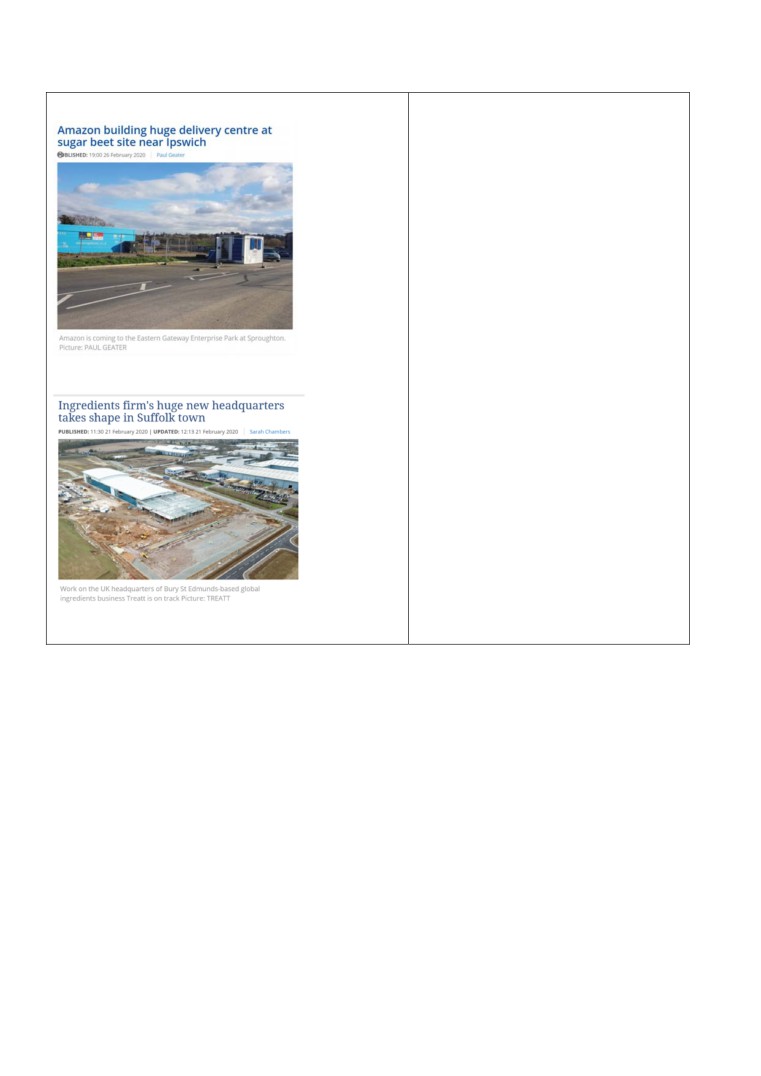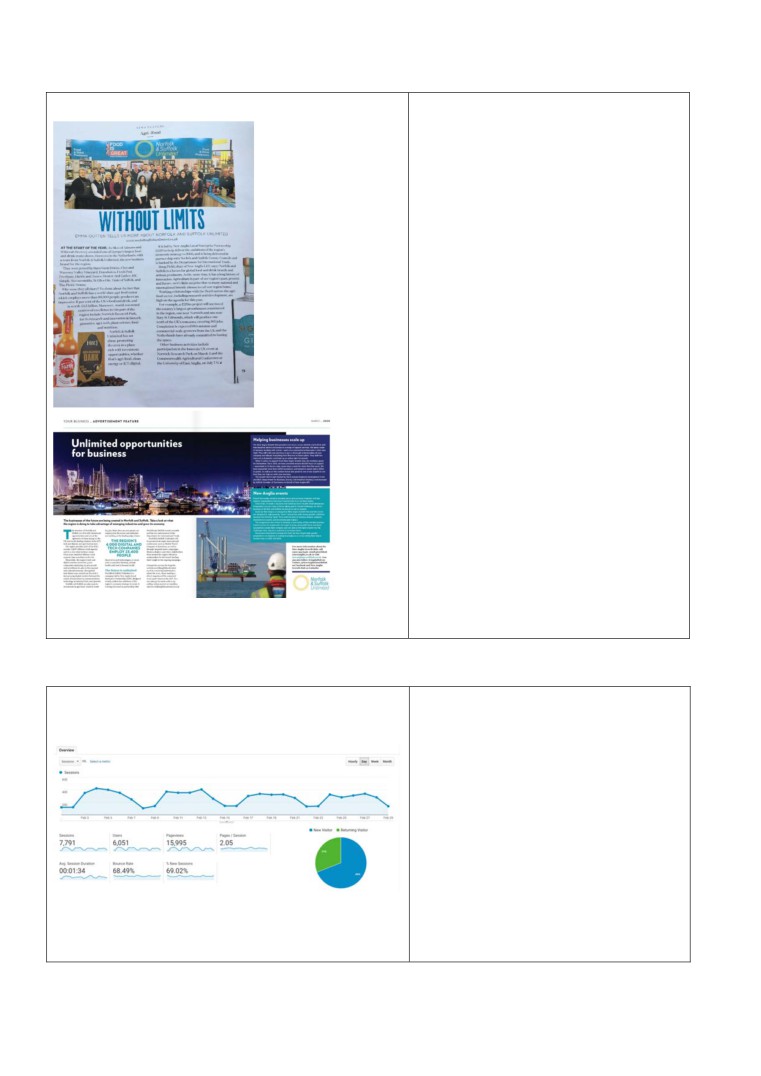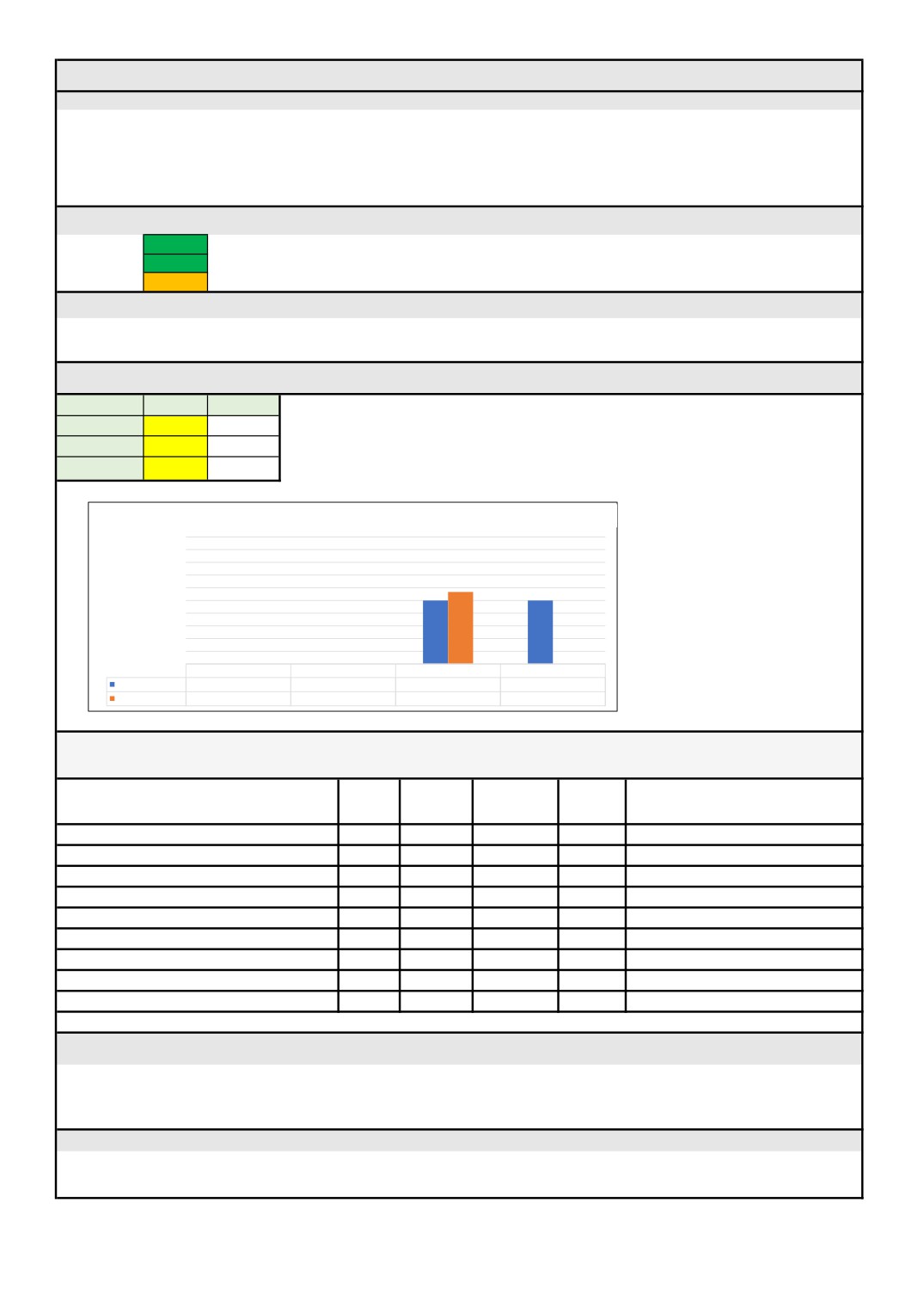New Anglia Local Enterprise Partnership Board Meeting
Meeting by conference call
Wednesday 25th March
10.00am to 12.00pm
Dial: 033 3443 3443
Room Number: 83889320 #
PIN: 3227 #
Agenda
No.
Item
Duration
15 mins
1.
Welcome from the Chair
2.
Apologies
3.
Declarations of Interest
4.
Actions / Minutes from the last meeting
Forward Looking
30 mins
5.
COVID-19 Impact on the LEP and local economy
Update
Governance and Delivery
75 mins
6.
LEP Delivery plan 20/21
For Approval
7.
LEP Operating Budget 20/21 - Confidential
For Approval
LEP Governance - Local Assurance Framework, Scheme of
8.
For Approval
Delegation and Accountable Body Agreement
9.
Freeports Consultation
Update
10.
EU Exit Transition
Update
11.
Election of Deputy Chair - Confidential
For Approval
12.
Chief Executive’s Report including confidential items
Update
13.
March Programme Performance Reports
Update
14.
Board Forward Plan
Update
15.
Any Other Business
1
New Anglia Board Meeting Minutes (Unconfirmed)
26th February 2020
Present:
Claire Cullens (CC)
Norfolk Community Foundation
David Ellesmere (DE)
Ipswich Borough Council
Doug Field (DF)
East of England Coop
Pete Joyner (PJ)
Shorthose Russell
Helen Langton (HL)
University of Suffolk
Dominic Keen (DK)
Britbots
Corrienne Peasgood (CP)
Norwich City College
Andrew Proctor (AP)
Norfolk County Council
Johnathan Reynolds (JR)
Opergy
Sandy Ruddock (SR)
Scarlett & Mustard
Alan Waters (AW)
Norwich City Council
Jeanette Wheeler (JW)
Birketts
Tim Whitley (TW)
BT
Attendees
Shan Lloyd (SL)
BEIS
Jai Raithatha (JR)
Suffolk County Council
Chris Dashper (CD)
New Anglia LEP - For Item 8
Julian Munson (JM)
New Anglia LEP - For Item 7
Lisa Roberts (LR)
New Anglia LEP - For Item 6
Chris Starkie (CS)
New Anglia LEP
Rosanne Wijnberg (RW)
New Anglia LEP
Helen Wilton (HW)
New Anglia LEP
1
3
Actions from the meeting: (26.02.20)
Clean Growth Taskforce
Board members to consider a pledge which the Board could make and submit suggestions
All
to the Chair.
Chief Executive’s Report
To receive an update on Freeports at the next Board meeting
CS
AOB
A letter of thanks from the Board to be written to long serving LEP employees on retirement
Chair
1
Welcome from the Chair
Doug Field (DF) welcomed everyone to the meeting and thanks David Ellesmere (DE) for hosting the
meeting.
2
Apologies
Apologies were received from Lindsey Rix, John Griffiths and Steve Oliver.
3
Declarations of Interest
Full declarations of interest can be found at http://www.newanglia.co.uk/about-us/the-board.
Chief Executives report: Institute of Technology discussion - Jeanette Wheeler (JW), Helen Langton
(HL), Corrienne Peasgood (CP) and Dominic Keen (DK).
4
Welcome from Cllr David Ellesmere
DE welcomed the board to Ipswich and highlighted the success of various local projects
such as the development of the Malthouse which had been supported by the LEP and key
new buildings in the Enterprise Zones (EZs).
DE note that the Cornhill had received significant investment from New Anglia which had
also provided funding for events assisting in achieving improved levels of footfall and an
increase in retail investment.
Further developments were taking place on other EZs in the town with announcements of
new investment due in the near future.
5
Minutes of the last meeting
The minutes were then accepted as a true record of the meeting held on 29th January 2020.
6
Establishment of Clean Growth Taskforce & Action Plan
Lisa Roberts (LR) reviewed the Clean Growth action plan requested by the board at the July
2019 meeting.
LR provided an overview of the steps required to develop a clean growth action plan which
will embed clean growth in all areas of LEP delivery. The plan identifies key steps which the
LEP should take to bring together key partners to collaborate, drive and implement the
actions needed to ensure the areas strengths as the UK’s clean growth region are fully
realised:
Establish a taskforce whose members will be ambassadors for the “Clean Growth
Region” and ensure that clean growth is consistently part of the development and
delivery of the Economic Strategy and Local Industrial Strategy.
Identify and agree to focus on the actions in areas that the LEP and partners can
achieve the biggest gains and impact.
Evolve the evidence base and ensure that the interventions identified will deliver the
desired outcomes
Work with partners in the development of the action plan to ensure their buy in and
commitment to their own role in delivering clean growth.
LR highlighted the LEP’s Environmental Policy and proposed that the Board consider
submitting a pledge of its own.
Andrew Proctor (AP) agreed with the direction of the work but asked where the funding
would come from to support the many actions identified.
2
4
LR confirmed that many of the interventions aligned with those in the Investment Plan
therefore funding would come from many different sources.
AP proposed that funding sources be identified and included in the clean growth plan.
Johnathan Reynolds (JR) noted that there was a significant degree of complexity involved in
coordinating between the boards and sub boards and the significant level of resource
required for this.
HL noted the size of the plan covered all elements of the LEP’s work and these ambitions
would prove challenging to deliver and proposed the aims should be more focussed with
more realistic delivery. HL also commented that pledges could be meaningless unless
those behind were completed committed to achieving the aim and had the means to do so.
DE identified the difference between ensuring all new growth was clean and trying to retrofit
clean growth requirements to existing projects. He proposed that interventions should
concentrate on practical help to new projects.
DF asked for the Terms of Reference to be amended to include reporting frequency and
suggested quarterly.
DF asked for suggestions for a pledge from the Board be submitted to him.
ACTION: Board members to consider a pledge which the Board could make and submit
suggestions to the Chair.
The Board agreed:
To note the content of the report
To the establishment of the Clean Growth Taskforce and its terms of reference subject to
inclusion of quarterly reporting
To agree steps outlined in the report to develop the action plan further
To note the LEP team Environmental policy and action plan
To consider ideas for a Board pledge which will sit within the LEP’s own action plan
7
Approach to Developing a Tourism Sector Action Plan
Julian Munson (JM) presented the proposal for developing a Tourism Action Plan which will
identify those interventions which will raise productivity and the value of the sector and better
position the region to secure Government investment.
JM highlighted the collaboration with Cambridge which faces challenges in retaining tourists
who visit the town briefly and could potentially extend their visits into Norfolk and Suffolk.
Alan Waters (AW) noted the importance of ensuring that those new jobs created were well
paid and highlighted the challenges posed for the tourism sector by the new immigration
proposals.
Pete Joyner (PJ) cited that transport and infrastructure issues could pose a challenge in
allowing staff to travel to tourist locations to work as housing prices proved too high to live
there.
JW noted that many businesses relied on staff from overseas and had not made plans to
manage any shortfalls proposing that the LEP could provide support to such businesses in
the planning.
The meeting agreed that it was vital to receive feedback from businesses around the issues
they face to allow the LEP to feed comments and case studies into Government.
DF queried how increased visitor numbers and improvements in transport infrastructure tied
in with the clean growth aspirations.
JM confirmed that more could be done to promote existing infrastructure and transport links
and tie tours in across the region. It was important to link in with providers such as Stansted
and Greater Anglia to ensure that tourism was considered within their plans.
3
5
JW noted that as the clean growth region there needed to be sufficient charging points and
tourism businesses who promote clean growth should be highlighted.
The Board agreed:
To note the content of the report
To endorse the proposal to develop a Tourism Action Plan
To approve the timeline and approach
8
Investment Plan Pipeline - Confidential
Chris Dashper (CD) presented the tactical project pipeline as requested at the last meeting
noting that this is an evolving document with a number of the currently in development with
partners while others at an earlier stage of development.
DF asked how clean growth aspirations were incorporated in the pipeline plans. CS
confirmed that clean and inclusive growth were included at the application stage.
JW asked how this fitted with the Investment Plan. CS confirmed that this was the starting
point of exiting projects and the Investment Plan would build on and augment this pipeline.
AP noted that projects would need to be prioritised and that the availability of funding would
impact on this process. AP also stressed the importance of getting buy in from MPs to
support the projects.
The Board agreed:
To note the content of the report
To endorse the project pipeline
9
Governance - Sub Board Reporting
Rosanne Wijnberg (RW) presented the proposed process for sub-board reporting which
ensures that the LEP Board are appraised of the priorities and progress of key sub-boards.
It was agreed that a limited number of key objectives would be reported against twice a year
and that clean growth would be included in the reporting.
David Ellesmere expressed a concern that the reporting would take up a considerable
amount of board meeting time.
DF noted that a number of the sub-boards were chaired by board members who would
manage the issue of the time and the reporting format.
Claire Cullens (CC) supported the plan as providing focus for sub-boards and also for giving
them the opportunity to escalate to the Board any issues impacting upon progress.
JR proposed circulating the reports from sub-boards to the others to allow for joined up
working and ease of identifying similar issues.
The Board agreed:
To note the content of the report
To approve the proposed reporting cycle and proposed reporting template
10
Election of Deputy Chair
CS presented the Board paper proposing the process for appointing a deputy chair.
The Board agreed:
To note the content of the report
To begin the process of appointing a deputy chair as outlined in this paper
11
Chief Executive’s Report
CS noted some of the highlights of the report and asked for questions from the board.
CS noted that the £1.1m ERDF application to extend the Growth Hub and the Small Grant
Scheme activity to the end of November 2021 is still awaiting approval from MHCLG.
4
6
DF proposed writing to express concern over the delay and the impact
DE asked if there was any impact if the funding was delayed into 2021 such as time
restrictions. CS confirmed this was not an issue in terms of timing of the spend.
HL, CP, DK and JW left the room.
CS confirmed that the Government has announced a second wave of bids to host an
Institute of Technology (IoT) and that the LEP has been asked to confirm its position. The
Board discussed the previous bid and the LEP’s involvement in the next round of
applications.
CS noted that clear feedback on the failure of the last bid has not been provided and
proposed that the LEP reviews all applications in the new round.
The Board agreed to provide support to all partners in compiling applications to host an IoT
HL, CP, DK and JW returned to the room.
CS advised that a consultation on Freeports is live and announcements for bids will follow.
LEPs & Mayorial authorities will be responsible for bids with only one bid per LEP area
according to current rules. New Anglia has begun conversations with 2 of the 3 companies
running ports in Norfolk & Suffolk.
AW noted that there were some issues around free ports and the wider economic impact
needed to be considered.
The Board agreed:
To note the content of the report
To provide support to all partners in compiling applications to host an IoT
To receive an update on Freeports at the next Board meeting
12
February Programme Performance Reports
RW reviewed the reports for February noting areas where delivery has been delayed or
claims not received which has impacted on claims.
RW presented the economic and programme dashboards noting that the skills data showed
a downturn but the figures behind this are not clear and the LEP has requested further
information.
The Board agreed:
To note the contents of the reports
To approve the Growth Deal Quarterly Dashboard
13
Board Forward Plan
CS reviewed the content of the next board meeting and asked for any additional items from
the Board.
The Board agreed:
To note the content of the plan
14
Any Other Business
DF noted that Nigel Best has retired and Keith Spanton will also be leaving shortly and prosed
writing that the Board write to long serving staff to staff thanking them for serving.
Next meeting:
Date and time of next meeting:
10.00am - 12.30pm, 25th March 2020
Venue: Equinor, Dudgeon Offshore Wind Farm, 50 South Denes Road, Gt Yarmouth, NR30 3PR
5
7
New Anglia Local Enterprise Partnership
Board Decision Log 2020 - Public
Date
Decision
Decision Made
Making Body*
04/03/2020
Growing
The Panel approved the following applications:
Business Fund
• Gold Star Metal Traders Limited - Agreed to support
Panel
Approved Grant: £180,000
• Dance and Dean Limited - Agreed to support
Approved grant - £60,000
• Dale Sheet Metals Limited - Agreed to support
Approved Grant: £154,400
• Crafted Media Limited - Agreed to support.
Approved Grant: £35,500
26/02/2020
LEP Board
The Board made the following decisions:
Establishment of Clean Growth Taskforce & Action Plan
• To approve the establishment of the Clean Growth Taskforce and its terms of reference subject to inclusion of quarterly reporting
• To agree steps outlined in the report to develop the action plan further
• To note the LEP team Environmental policy and action plan
• To consider ideas for a Board pledge which will sit within the LEP’s own action plan
Approach to Developing a Tourism Sector Action Plan
• To endorse the proposal to develop a Tourism Action Plan and to approve the timeline and approach
Investment Plan Pipeline - Confidential
• To endorse the project pipeline
Governance - Sub Board Reporting
• To approve the proposed reporting cycle and proposed reporting template
Election of Deputy Chair
• To begin the process of appointing a deputy chair as outlined in this paper
Chief Executive’s Report
• To provide support to all partners in compiling applications to host an IoT
To receive an update on Freeports at the next Board meeting
February Programme Performance Reports
• To approve the Growth Deal Quarterly Dashboard
05/02/2020
Growing
The Panel approved the following application:
Business Fund
Focus Trovex LLP - Agreed to support
Panel
Approved Grant: £73,400
• Condimentum Ltd - Agreed to support
Approved increase to the existing grant - £118,483
29/01/2020
LEP Board
The Board made the following decisions:
Local Industrial Strategy - Investment Plan
• To approve the designed version of Norfolk and Suffolk Local Industrial Strategy
* New Anglia Local Enterprise Partnership Board, Investment Appraisal Committee, Growing Business Fund Panel, Remuneration Committee, Audit & Risk Committee
Actions from New Anglia LEP Board Meetings
Date
Item
Action
Update
Actioned
Target Date
By
26/02/2020
AOB
A letter of thanks from the Board to be written to long serving LEP employees on retirement
Chair
Apr-20
26/02/2020
Chief Executive’s Report
To receive an update on Freeports at the next Board meeting
Included in the March Board meeting papers
CS
Complete
26/02/2020
Clean Growth Taskforce
Board members to consider a pledge which the Board could make and submit suggestions to
All
Apr-20
the Chair.
25/06/2019
GE Update Report
To provide the Board with regular reporting of the pipeline of visits relating to inward
To be included in the next Inward Investment update report
DD
May-20
investment and subsequent outcomes
23/05/2019
Growth Hub Presentation
Growth Hub Annual review to be circulated to the Board when published
Review began in autumn 2019. Final report is expected in spring 2020
CD
May-20
10
New Anglia Local Enterprise Partnership Board
Wednesday 25th March 2020
Agenda Item 5
COVID-19 Impact on the LEP and the Local Economy
Author: James Allen Presenter: Chris Starkie
Summary
This report provides an update on the Government’s support for businesses, the LEP and
Growth Hub’s response to the crisis, and local intelligence on how coronavirus is already
affecting businesses.
Please note this paper was drafted on 17/3/2020 therefore given the fast moving
situation, a further verbal update will be provided at the board meeting.
Recommendation
The Board is asked to note the contents of the report.
Background
On 30th January, WHO declared the outbreak of COVID-19 a “Public Health Emergency of
International Concern” (PHEIC). The UK government published an Action Plan on 3 March
2020 which highlights that as it is a new virus, the lack of immunity in the population (and the
absence as yet of an effective vaccine) means that COVID-19 has the potential to spread
extensively.
In the budget statement on 11th March, the Chancellor set out a package of temporary and
targeted measures to support businesses through this period of disruption, including:
Statutory sick pay relief package for SMEs.
Business Rate Relief for small businesses and pubs.
Small business grant funding of £3,000 for all business in receipt of Small Business
Rates Relief (SBRR) and Rural Rates Relief.
Coronavirus Business Interruption Loan Scheme to support long-term viable businesses
who may need to respond to cash-flow pressures by seeking additional finance.
HMRC Time To Pay Scheme.
On 17 March, the Chancellor updated the package of temporary and targeted measures to
support public services, people and businesses through this period of disruption. This includes
the following package of measures to support businesses:
Statutory sick pay relief package for SMEs
12-month business rates holiday for all retail, hospitality and leisure businesses in
England
1
11
Small business grant funding of £10,000 for all business in receipt of small business
rate relief or rural rate relief
Grant funding of £25,000 for retail, hospitality and leisure businesses with property with
a rateable value between £15,000 and £51,000
Coronavirus Business Interruption Loan Scheme to support long-term viable businesses
who may need to respond to cash-flow pressures by seeking additional finance
HMRC Time To Pay Scheme
Support for businesses who are paying sick pay to employees
Government will bring forward legislation to allow small- and medium-sized businesses
and employers to reclaim Statutory Sick Pay (SSP) paid for sickness absence due
to COVID-19. The eligibility criteria for the scheme will be as follows:
o this refund will cover up to 2 weeks’ SSP per eligible employee who has been off
work because of COVID-19
o employers with fewer than 250 employees will be eligible - the size of an employer
will be determined by the number of people they employed as of 28 February 2020
o employers will be able to reclaim expenditure for any employee who has
claimed SSP (according to the new eligibility criteria) as a result of COVID-19
o employers should maintain records of staff absences and payments of SSP, but
employees will not need to provide a GP fit note
o eligible period for the scheme will commence the day after the regulations on the
extension of Statutory Sick Pay to those staying at home comes into force
o the government will work with employers over the coming months to set up the
repayment mechanism for employers as soon as possible
Support for businesses that pay business rates
Introducing a business rates retail holiday for retail, hospitality and leisure businesses in
England for the 2020 to 2021 tax year.
Businesses that received the retail discount in the 2019-2020 tax year will be rebilled by
their local authority as soon as possible.
A £25,000 grant will be provided to retail, hospitality and leisure businesses operating
from smaller premises, with a rateable value between £15,000 and £51,000.
Any enquiries on eligibility for, or provision of, the reliefs should be directed to the
relevant local authority. Guidance for local authorities on the business rates holiday will
be published by 20 March.
Support for businesses that pay little or no business rates
The government will provide additional funding for local authorities to support small
businesses that already pay little or no business rates because of small business rate
relief (SBBR). This will provide a one-off grant of £10,000 to businesses currently
eligible for SBRR or rural rate relief, to help meet their ongoing business costs.
If a business is eligible for SBRR or rural rate relief, they will be contacted by their local
authority.
Funding for the scheme will be provided to local authorities by government in early April.
Guidance for local authorities on the scheme will be provided shortly.
Support for businesses through the Coronavirus Business Interruption Loan Scheme
A new temporary Coronavirus Business Interruption Loan Scheme, delivered by the
British Business Bank, will launch next week to support businesses to access bank
lending and overdrafts.
2
12
The government will provide lenders with a guarantee of 80% on each loan (subject to a
per-lender cap on claims) to give lenders further confidence in continuing to provide
finance to SMEs.
The government will not charge businesses or banks for this guarantee, and the
Scheme will support loans of up to £5 million in value. Businesses can access the first 6
months of that finance interest free, as government will cover the first 6 months of
interest payments.
Support for businesses paying tax
All businesses and self-employed people in financial distress, and with outstanding tax
liabilities, may be eligible to receive support with their tax affairs through HMRC’s Time
To Pay service. These arrangements are agreed on a case-by-case basis and are
tailored to individual circumstances and liabilities. Businesses are encouraged to call
HMRC’s dedicated helpline if they are concerned about their ability to pay tax due to
COVID-19.
Insurance
Businesses that have cover for both pandemics and government-ordered closure should
be covered, as the government and insurance industry confirmed on 17 March 2020
that advice to avoid pubs, theatres etc is sufficient to make a claim.
Insurance policies differ significantly, so businesses are encouraged to check the terms
and conditions of their specific policy and contact their providers. Most businesses are
unlikely to be covered, as standard business interruption insurance policies are
dependent on damage to property and will exclude pandemics.
Impact on LEP Operations
New Anglia LEP is following Government guidance and taking direction from the Government’s
action plan.
The LEP team is moving to remote working with all staff being encouraged to work from
home. This is due to be completed the week beginning March 23rd.
The LEP team will not be attending meetings or conferences and restricting travel
wherever possible.
LEP meetings are being transitioned to conference calls or by use of Teams and LEP
team members are participating in external meetings by conference call or Teams or
other suitable platforms.
The LEP leadership team (heads of departments) are now holding a daily Teams
conference call chaired by the CEO or COO.
The weekly all team meeting will be hosted by Teams and chaired by the CEO or COO.
Individual teams are holding regular update calls to keep in touch with all team
members.
The LEP’s internal Brexit team has been repurposed as a Business Resilience team,
and is meeting via Teams to coordinate LEP internal activity. We anticipate these
meetings moving from weekly to daily.
We are also running the self-isolation protocol in lines with latest Government advice. 14
days if a staff member or family member develops COVID-19 symptoms.
A number of staff are in self-isolation as a result of a family member developing COVI-
19 symptoms.
The LEP is also supporting team members as much as possible that have to take time
off work to look after dependants or make child arrangements.
3
13
Business Support
The LEP and Growth Hub’s role is to act as the primary local conduit to ensure local
businesses have access to the latest government advice.
An email has been sent to over 9,000 businesses across Norfolk and Suffolk that we have
worked with to signpost government advice and support that is available to them.
Both the New Anglia LEP and Growth Hub websites have been updated to provide employers
and businesses with the latest government advice and will continue to be updated on a daily
basis.
The LEP and Growth Hub social media accounts will reinforce and promote the support
available to businesses via the Growth Hub.
The Growth Hub is now operating as a phone based service, with face to face activity either
one to one or in groups ceasing.
We are working on expanding the capacity of the Growth Hub by utilising LEP staff, as well as
colleagues from local enterprise agencies and local authority partners.
The LEP and Growth Hub teams are working with their regional and national colleagues to
ensure our advisers are fully briefed on the Government support that has been made available
by Government and most importantly the best ways to access it.
We are also in discussions with colleagues from the FSB, chambers of commerce and local
authorities as well as other partners such as our sector groups and innovation centres about
disseminating information in a consistent, accurate and timely fashion.
A clear concern is that businesses will be inundated with too much information.
The LEP team is also reviewing our existing programmes to see what impact the corona virus is
having on the delivery of these programmes.
We are also looking to see how we might flex our existing programme suite to provide
additional support for businesses.
Under our Growth Deal with Government we have the ability to make changes to our
programmes without the need for Government sign off.
We are also looking at our overall business plan to see which activities can be paused or will
need to be paused, in order to free up more capacity to focus on business support.
We are also in dialogue with Government about additional measures we wish to see introduced
to provide further support to businesses, based on intelligence we are gathering.
This could include measures such as an extension to the Enterprise Zone rates relief period
and further funding for our grants programmes and Growth Hub.
Business Intelligence
Businesses have been highlighting the impacts of coronavirus on their operations, including:
Various local companies have put a halt on their staff attending non-urgent external
meetings or allowing concerned staff to cancel their attendance at meetings.
4
14
A Suffolk Chamber of Commerce survey found 64% of the 133 respondents have
already been affected by coronavirus and many are changing the way they work. Supply
chain disruption was the most common problem identified.
A Norfolk-based clothing company was set to launch a new clothing line in March. The
range was produced in China but cannot be shipped due to coronavirus. There is now
valuable product stuck in China and a contract to supply clothing cannot be fulfilled.
A local first aid company has had to invest additional time and money on new virucidal
wipes for cleaning manikins fully after each course and equipment is laundered more
frequently. Delegates are now being issued with a personal face shield on each course.
Various local travel companies been forced to cancel specialist trips to Italy and
elsewhere, which would have flown out of Norwich Airport.
Due to panic buying, local supermarkets have introduced temporary limitations on
certain items such as hygiene products and toilet rolls. These supermarkets are working
with their supply chain to keep stores as well stocked as possible.
Concert venues have reported a drop in ticket sales, despite no/minimal cancellations
from sponsors or promoters.
Some local hotels have reported a drop in bookings directly linked to the coronavirus,
both conferences and holiday bookings.
Greater Anglia has stepped up the hygiene regime on its trains to combat coronavirus.
Local universities are monitoring large-scale events planned, some of which are
business critical such as recruitment fairs and open days and will stick to the guidance.
Recommendation
The Board is asked to note the contents of the report.
5
15
New Anglia Local Enterprise Partnership Board
Wednesday 25th March 2020
Agenda Item 6
LEP Delivery Plan 20/21
Author: Rosanne Wijnberg
Summary
This paper seeks agreement for a new LEP delivery plan for 20/21. This plan will follow the
circulation of the main board papers.
Delivery plans are a requirement of the Government’s Review of LEPs. The New Anglia LEP
Delivery Plan 20/21 will meet the requirements of Government but also provide a plan which
will be a useful tool for the board and wider stakeholders by providing a concise outline of the
main objectives, initiatives and targets of the LEP over the coming 12 months.
Recommendation
The LEP Board is asked to approve the Delivery Plan and delegate to the LEP chief executive
authority to make minor changes necessary ahead of publication on 1 May 2020.
Background
One of the key actions from the Government’s Review of LEPs is the requirement of all LEPs to
produce a Delivery Plan.
The delivery plans will complement the annual reviews which LEPs are also required to
produce starting in the 19/20 financial year. We published our first annual review a year ahead
of that deadline - last autumn for the 18/19 financial year.
The Government working with the LEP Network has produced guidance on what information is
required in the new delivery plan - the Delivery Plan Matrix - to ensure a level of consistency
across the LEP network.
The Delivery Plan must be completed by the end and published on our website by 1st May
2020. Given that we do not have a LEP Board meeting scheduled in April, we are seeking
approval for the approach we have taken and the narrative. We will then update the numbers
after the end of the financial year, and complete the design elements of the Delivery Plan.
The advice we have been given indicates that the Delivery Plans for 20/21 are in line with those
produced for 19/20.
Our Approach
The production of a Delivery Plan is a Government requirement.
Our plan is to produce a document which satisfies the Government’s requirements but is also a
useful document for the board and wider stakeholders, by providing a concise outline of the
main objectives, initiatives and targets of the LEP over the coming 12 months.
1
17
The delivery plan will build on the delivery priorities agreed by the board at its January meeting.
These are:
1. Implement
We will continue to focus on turning the ambitions identified in our Economic Strategy and Local
Industrial Strategy into actions.
A priority will be to take forward our clean growth ambitions and create a plan with meaningful
actions. We will gather momentum behind our industry councils and develop our investment
plan. We will support partners to develop Town Deal bids.
2. Promote
We will use our Norfolk & Suffolk Unlimited brand as an inward investment tool to attract private
sector investment and to recruit talented workers. We will also use it as a tool to enhance our
influence with Government, working with our MPs to secure more funding from Government
and more recognition of our region’s strengths.
We will promote the LPA’s achievements, impacts and broaden our message among local and
national stakeholders and businesses.
3. Deliver
We will continue to deliver our programmes and look to extend them where we can. We have
stepped up monitoring to give us better information on programme performance so that we can
ensure we are delivering.
This year we will focus on evaluation and understanding our impact. We will embed clean
growth and inclusive growth as well as productivity into programme criteria as well as
evaluation.
4. Strengthen
We need to continue strengthening the organisation, its governance and its finances.
In particular there will be a focus this year on board succession.
We will also proactively look for opportunities for funding to strengthen the work of the LEP and
ensure its sustainability.
The Delivery Plan outlines how we will be deliver on our mission, priorities and outputs from
April 2020 to March 2021.
It covers our key strategic initiatives for the year, our partnership work and the full range of the
programmes directly delivered by the LEP from the Growth Deal and Enterprise Zones to
programmes such as Growing Places Fund and Growing Business Fund.
Accompanying the Delivery Plan is the 20/21 Operational Budget - See Agenda Item 7.
Recommendation
The LEP Board is asked to approve the Delivery Plan and delegate to the LEP chief executive
authority to make minor changes necessary ahead of publication on 1 May 2020.
2
18
New Anglia Local Enterprise Partnership Board
Wednesday 25th March 2020
Agenda Item 8
New Anglia LEP Governance: Local Assurance Framework, Accountable Body
Agreement, Scheme of Delegation
Author: Melanie Richardson
Presenter: Rosanne Wijnberg
Summary
The LEP’s Assurance Framework, Scheme of Delegation and Accountable Body Agreement with
Suffolk County Council have all been updated, to ensure they are in line with newly published
Government guidance and that all the information contained in them is accurate and up to date.
Recommendation
The Board is recommended to approve and adopt the:
-
2020 Local Assurance Framework,
-
Scheme of Delegation,
-
Accountable Body Agreement.
Background
New Anglia LEP’s Local Assurance Framework follows the mandatory requirements and
additional best practice guidance set out in the Government’s National Local Growth Assurance
Framework, which seeks to provide a common framework of understanding of the assurance
required for local growth funding.
The National Local Growth Assurance Framework explains how places should appraise, monitor
and evaluate schemes to achieve value for money. It provides Government, stakeholders and
the public the necessary assurances that LEPs have the policies and processes in place to
ensure the robust stewardship of public funds. It contains mandatory governance, accountability
and transparency requirements and non-mandatory best practice.
New Anglia LEP’s Scheme of Delegation sets out the main responsibilities and functions of the
organisation and the level to which they have been delegated. It is a requirement of the National
Local Growth Assurance Framework for the LEP to have a comprehensive Scheme of Delegation
which is reviewed and updated annually.
The Accountable Body Agreement is a key element of the LEP’s Governance arrangements,
alongside the Articles of Association, the Assurance Framework and Scheme of Delegation. It
sets out the respective roles of the LEP and Suffolk County Council as the Accountable Body.
Key Considerations
The draft 2020 Local Assurance Framework can be viewed here. The main revisions are to
incorporate new programmes, policies and practice adopted by the LEP. To facilitate review we
have highlighted these changes in yellow.
1
25
The Scheme of Delegation is attached at Appendix 1, with the proposed minor revisions
highlighted.
The Accountable Body Agreement is attached at Appendix 2, with the proposed minor revisions
highlighted.
The Scheme of Delegation and Accountable Body Agreement have been reviewed by Audit and
Risk Committee.
Monitoring Compliance
The National Local Growth Assurance Framework checklist provides the basis for our compliance
monitoring arrangements.
An owner has been assigned to each area and is accountable for compliance. This is monitored
on a quarterly basis and reported to the Audit and Risk Committee.
Any updates to the documents required for example by Government policy changes or the
introduction of new programmes will be reported to the LEP board for consideration.
Next Steps
The approved documents will be loaded on the LEP website, and the next annual review will be
scheduled for March 2021.
Recommendation
The Board is recommended to approve and adopt the:
-
2020 Local Assurance Framework,
-
Scheme of Delegation,
-
Accountable Body Agreement
2
26
Appendix 1
New Anglia LEP Scheme of Delegation
Context
The New Anglia Local Enterprise Partnership is company limited by guarantee, with 18
voluntary directors, supported by a full-time executive team.
This scheme of delegation sets out the main responsibilities and functions of the organisation
and the level to which they have been delegated.
The scheme of delegation is part of a suite of LEP governance documents including:
Local Assurance Framework, Articles of Association, terms of reference for sub-boards and
sub-committees, and agreement between Suffolk County Council (accountable body) and the
LEP.
The scheme of delegation is reviewed annually and changes require board approval. Any
decision taken in contravention of this scheme of delegation will be deemed invalid.
Key responsibilities of the LEP Board
The board is responsible for:
Approving the strategic direction of the LEP
Agreeing clear objectives to focus activity and drive ambition
Ensuring the LEP runs efficiently and effectively with appropriate controls in place
covering performance, finance and risk
Upholding the values, ethos and culture of the organisation
Key responsibilities of the Accountable Body
The Section 151 Officer or their appointed deputy is a core member of the Audit and
Risk Committee.
The Section 151 Officer is accountable for approving all Growth Deal grant agreements,
and delegates authority to a suitable team member for approval of grants awarded
under other LEP programmes.
Scheme of Delegation
Issue
Delegated To
Strategy
Vision, mission and values
Board
Development and approval of Economic strategy
Board
1
27
Implementation of Economic strategy
Economic Strategy Delivery
Coordination Board
recommendations to main Board
Changes to the overall operating structure of the LEP
Board
Approval of the Organisation brand
Board
Programmes
Design of capital and revenue funding programmes
Board (on recommendations from
Investment Appraisal Committee
and relevant sub-boards)
Awarding of capital or revenue funding to programmes
Board (on recommendations from
above £500k
IAC)
Awarding of capital or revenue funding to programmes
IAC
£500k or below
Awards from Growing Business Fund up to £500k
GBF panel (overseen by the IAC)
In programme funding changes above £100,000
Board
In programme funding changes up to £100,000
IAC
Change requests from programmes/projects with no
IAC
financial implications but major changes to outputs
or timeline
Change requests from programmes/projects with no
CEO - reported retrospectively to
financial implications but minor changes to outputs
the Board quarterly
or timeline
Governance
Responsibility for compliance with Government
Chair and CEO
National Assurance Framework
Board
Annual declaration of compliance to Government
Suffolk County Council 151 Officer
Maintenance of Register of Interests
Board and CEO
Timely publication of agendas, reports and minutes
Chair, CEO and COO
Committee and Delivery Board appointments
Board
Code of conduct, Complaints and Whistleblowing policies Board
2
28
Finance
Approval of financial budgets and forecasts
Board
Approval of annual accounts and financial statement
Board on recommendation
and audit letter of representation
from Audit and Risk Committee
Approval of bank account and mandate policy
Board on recommendation of Audit
and Risk Committee
Treasury policy
Board on recommendation of Audit
and Risk Committee
Bank investments execution
Audit and Risk committee
Prior authorised expenditure for day to day business, in
accordance with strategy budget and approved policies:
Over £150,000
Board
Between £50,000 and £150,000
Chair and CEO or COO
Up to £50,000
CEO and COO or financial controller
Human Resources
Performance management and remuneration of CEO
Chair and Remuneration Committee
Remuneration of Chief Operating Officer
Chair and Remuneration Committee
Recruitment of board members
Board (with recommendations from
sub panel comprising board
members)
Recruitment of CEO
Board (with recommendations from
sub panel comprising board
members)
Operational procedures and policies for Leadership team COO in conjunction with CEO and
and below
Leadership team
Last Updated: 11th March 2019 and confirmed at the LEP Board on 27th March 2019.
3
29
Appendix 2
THIS ACCOUNTABLE BODY AGREEMENT (ABA) IS MADE ON 24th February
2015 BETWEEN
(1) NEW ANGLIA LOCAL ENTERPRISE PARTNERSHIP of Centrum, Norwich
Research Park, Norwich, NR4 7UG (New Anglia LEP) and
(2) SUFFOLK COUNTY COUNCIL of Endeavour House 8 Russell Road
Ipswich IP1 2BX (SCC)
1. INTRODUCTION
1.1
The purpose of this ABA is to set out the framework for respective roles and
responsibilities of New Anglia LEP as the organisation which has
responsibility for making decisions on the project activity that the various
funds set out at clause 2.2 below will support, along with other funding arising
out of the Norfolk and Suffolk Economic Strategy, and SCC (as the
organisation taking on the role of “Accountable Body” for New Anglia LEP and
the funds set out at clause 2.2 below) who will have responsibility for ensuring
that such decisions meet the legal, regulatory and funding criteria applicable
at the time of decision and during the period of the project activity.
2. BACKGROUND AND CONTEXT
2.1
New Anglia LEP has been established to work with businesses and partners
across the education, voluntary and public sector, to help grow jobs in Norfolk
and Suffolk.
2.2
New Anglia LEP and SCC have developed in line with Government guidance
a single assurance framework (“Assurance Framework”) covering all
Government funding flowing through New Anglia LEP, to ensure New Anglia
LEP has robust value for money processes in place. The purpose of the LEP
Assurance Framework is to support the developing confidence in delegating
funding from central budgets and programmes via a single pot mechanism to
LEPs and their accountable bodies. The Accountable Body is required to sign
off the Assurance Framework.
2.3
New Anglia LEP has responsibility for deciding the project activities that
Growth Deal funds will be allocated to which in this ABA, are referred to
collectively as “the Programme”.
£290 million has been made available to
New Anglia LEP from 2014 to 2021 as part of the Government’s Growth Deal
programme, for which all 38 LEPs across England have been invited to
compete for an individual allocation. Growth Deals provide funds to local
enterprise partnerships or LEPs for projects and programmes that benefit the
local area and economy.
υ
30
2.4
New Anglia LEP’s particular objectives for the Programmes can be found in
the relevant chapter of the Assurance Framework and include:
2.4.1 The Growing Places fund is a recycling loan fund which has been in operation
in the New Anglia region since 2012.
The fund was designed to address the problems facing stalled developments, by
providing financial support towards costs such as site infrastructure, services or
access.
The fund operates predominantly as a loan fund but has awarded small grants where
a regionally significant project can be delivered as a result and where the grant secures
a major match funding contribution.
The Growing Places Fund is open to public and private applicants. The Fund now
stands at a total allocation of approximately £32 million which has been matched by in
excess of £280 million from public and private sources. The Fund has committed over
£25 million on
28 capital investment projects and has supported
7 sector
developments. The fund remains open to applications and has a pipeline of projects
for consideration.
2.4.2
The Growing Business Fund is a grant fund which has been in operation in the New
Anglia region since April 2013. The fund was initially supported by the Regional
Growth Fund, with £12m awarded from Rounds 3 and 4 of the funding. In 2015 the
New Anglia LEP secured an additional £25.57m by 2021 from the Local Growth Fund
through the Growth Deals. The Fund provides grants between £25,000 and £500,000
to local businesses across Norfolk and Suffolk.
The fund supports the capital costs of expansion by the businesses, up to the
maximum allowable contribution under General Block Exemption Regulations
(GBER) Articles 14, 17, and 19, of up to 20% of the costs of the project for small
businesses employing less than 50 people.
Medium sized businesses can receive funding of up to 10% towards the project cost
or 20% if regulated by De Minimis, but no more than equivalent of EUR200,000
around £171k (official exchange rate as of January 2020).
2.4.3
The Small Grant Scheme is a grant fund that has been in operation in the New Anglia
region since August 2013. The programme is currently part of New Anglia Business
Growth Programme supported by £12.48m from the European Regional
Development Fund. It provides grants between £1,000 and £25,000 to local
businesses across Norfolk and Suffolk.
The programme supports SMEs through the provision of grants to assist them to
grow and expand, employ new staff, introduce new products and services, improve
productivity or efficiency, increase their competitiveness etc.
Small businesses employing less than 50 people may apply for up to 20% of the
costs of the project under General Block Exemption Regulations (GBER) Articles 14,
17, 18 and 19. Medium sized businesses may apply for funding of up to 10% towards
the project cost or 20% if regulated by De Minimis regulations (EUR 200,000 is a
maximum amount of all De minimis aid a business may receive over a 3 year fiscal
period). SMEs based in an Assisted Area may apply for an additional 10% of funding.
φ
31
3. TERM AND TERMINATION OF ABA
3.1
This ABA, once signed by both parties, will be deemed to have come into effect
on 7th July 2014 and will continue in place until 31 March 2021 unless it is
terminated in accordance with the other provisions of clause 3. The ABA can
be extended beyond 31 March 2021 if agreed by both parties. There will also
be a ‘light touch’ review each year to allow discussion of progress reported to
the Audit and Risk Committee and early discussion of any changes necessary
in the changing landscape of LEP funding and programming.
3.2
Subject to clauses 3.3 and 3.4 if, at any time during the term of this ABA, either
party wishes to bring the ABA to an end, the following consultation and notice
procedures shall apply:
(a) the party proposing to terminate the ABA must consult the other party about
the termination in good time and in any event, at least, nine months before the
proposed termination of the ABA,
(b) the party terminating the ABA must give at least six months’ written notice
to the other party,
3.3
If a party to the ABA commits a material breach of any term of the ABA, the
other party may send a written notice to the breaching party, setting out the
nature of the breach and the required remedy and giving not less than three
months’ notice to remedy the breach. If the breach has not been remedied at
the end of the notice period, then the party who served the notice may serve a
further notice of two months, terminating the ABA.
3.4
Where the operative period for a Programme comes to an end or the funding
under the Programme ceases, this ABA shall terminate in part in relation to that
Programme.
3.5
In any circumstance where this ABA terminates in whole or in part, and without
prejudice to any other rights or remedies the parties may have, the parties must
use their best endeavours to have in place, from the date of termination of the
ABA or the relevant part of the ABA, arrangements for transferring existing
agreements and liabilities, for example under the various grant and loan
agreements that SCC will have entered into on behalf of New Anglia LEP, to a
replacement Accountable Body.
3.6
Where it is not possible for existing agreements and liabilities to be transferred
(or it is agreed that they shall not transfer) and as a result SCC retains some or
all of such liabilities, New Anglia LEP shall indemnify SCC against those
liabilities and shall provide sufficient funding for SCC to meet those liabilities
e.g. under grant and loan agreements.
3.7
New Anglia LEP shall indemnify SCC against any financial costs or liabilities
incurred, including but not limited to redundancy costs, on the termination of the
ABA in whole or in part except where termination takes place under clause 3.3
as a result of an un-remedied breach by SCC.
χ
32
AGREEMENT
4. ROLES AND RESPONSIBILITIES OF NEW ANGLIA LOCAL ENTERPRISE
PARTNERSHIP
New Anglia LEP shall:
4.1.
Comply with all the regulations and guidance notes from the Ministry for
Housing, Communities and Local Government, Cabinet Office, Department for
Business, Energy and Industrial Strategy, and other relevant funding bodies
including but not exhaustively: state aid regulations, relevant departmental
funding criteria and the wider regulatory framework for the funds included in this
agreement ensuring that funds are used appropriately, and in a manner that is
consistent with the contents of any offer letters from government.
4.2.
Decide the economic growth priorities and strategies for the Programme and
the overall grant allocations in line with the initial submission and the funding
agreement for the Programme.
4.3.
Approve and submit to SCC an annual delivery plan of planned expenditure
and outcome and output targets - this may take the form of a copy of any such
report sent to the LEP Board.
4.4.
Strive to achieve all the outputs and key indicators set out in the delivery plan
for the Programmes and produce an annual progress report as required by the
funding bodies.
4.5.
Develop close working links and joint working arrangements with SCC, other
Local Enterprise Partnerships and other relevant bodies as appropriate.
4.6.
Set up appropriate consultation procedures, business involvement and
membership of New Anglia LEP’s Board to facilitate the development and
implementation of the Programmes.
4.7.
Have in place appropriate processes with funding guidelines and criteria and
make decisions about the approval of projects in accordance with the guidelines
and criteria. This is subject to the requirements of the relevant funding body
and should be in line with the regulatory and legal framework for the funding
after considering any recommendations from SCC. This will include an
appropriate risk appraisal and management process.
4.8.
Agree with SCC and implement policies and procedures for ensuring value for
money in the use of funds, whether by New Anglia LEP or by the organisations
which are funded through the Programmes. This will include the establishment
of and compliance with appropriate procedures relating to:
(a) competitive tendering and procurement where New Anglia LEP is
purchasing goods, services or works. and
ψ
33
(b) the processes to be followed by organisations funded through the
Programmes, for example, by requiring competitive tendering of goods,
services or works funded through the Programmes where appropriate
In relation to (a), if SCC procures and enters into contracts for goods, services
or works for New Anglia LEP, then SCC procurement procedures will be
followed. New Anglia LEP is a contracting authority for the purposes of the
Public Contracts Regulations, so if New Anglia LEP procures and enters into
the contracts then it will do so in line with relevant EU procurement rules and
the internal procedures that are to be established under this clause.
4.9. Ensure that proper procedures exist for the regular monitoring of progress in
implementing the Programmes.
4.10. Evaluate the impact of the Programmes through appropriate measures, if
necessary agreed with SCC, to comply with relevant funders’ requirements.
4.11. Work with SCC in drafting and developing written procedures and appropriate
management, administration, finance and IT systems for the Programmes
covered by this ABA. New Anglia LEP will develop its own procedures which
are outside the scope of this ABA.
4.12.
Ensure that both New Anglia LEP and, to the extent that it is appropriate to the
nature of the relevant project those organisations to whom funding is provided,
have in place effective policies and procedures to:
I.
ensure equality of opportunity and diversity in employment of staff and
delivery of services. These should demonstrate how all parties will
comply with relevant equality legislation and respective Codes of
Practice. Evidence of the implementation of this policy shall be kept
available for inspection.
II.
ensure that all relevant legislation and guidance on state aid is complied
with.
III.
ensure open and transparent commissioning processes are used
including for the purchase of goods and services which adhere to
relevant legal procurement and commissioning processes. This
includes EU procurement rules where relevant.
IV.
ensure the health and safety of staff and service users in compliance
with relevant Health and Safety legislation.
V.
ensure where the project involves work with children and young people,
projects should have in place procedures for ensuring compliance with
relevant Children’s and Young Persons legislation.
VI.
ensure that, in the event of SCC receiving a complaint about New Anglia
LEP or a constituent project, the relevant party/ies is/are required to co-
operate fully with them in the investigation and resolution of the
ω
34
complaint, including complying with any recommendations arising from
such investigation.
VII.
respond to requests for information under Freedom of Information Act
1998 (FoI) and related legislation. If New Anglia LEP or SCC receive an
FoI request both parties shall provide such information as is required by
them to enable a full response to be made to the request within the
statutory time limit. It is accepted that New Anglia LEP is exempt from
FoI in the body of the legislation but the Assurance Framework issued
by BEIS makes it a requirement that New Anglia LEP complies with the
spirit of this legislation and New Anglia LEP confirms that it will do so. It
should be noted that applicants are currently advised that information
will be treated as commercially sensitive in the event of an FOI request
being received, although this cannot be guaranteed until the individual
circumstance arises.
VIII. comply with The General Data Protection Regulation.
4.13.
Co-operate with SCC or any external or internal auditors appointed and to make
available for inspection all documentation and provide responses to any queries
raised.
4.14.
Work with SCC to ensure value for money and probity are achieved in the
delivery of the Programmes and by individual projects.
4.15.
Ensure that any assistance given to an organisation by New Anglia LEP is
within the limits laid down by any obligation of the European Union or
appropriate funding organisation, and that all relevant procurement procedures
are met; should this not be the case, there will be reduction in, or repayment of,
grant.
4.16.
Make arrangements for the effective monitoring of individual projects within
procedures agreed with SCC and make any necessary changes to achieve
targets and the overall Programme.
4.17.
Ensure that accounts are maintained by relevant officers (particularly the New
Anglia LEP Financial Controller) from New Anglia LEP.
4.18
Permit SCC to use the funds allocated to the LEP to carry out its Accountable
Body role, including the allocation of loan and grant funding to an SCC account
and shall permit SCC to retain such funding until such time as SCC’s obligations
under this ABA and any grant or loan or other agreements made as a result of
the ABA or SCC’s role as Accountable Body are discharged or transferred to a
third party”
4.19
Work with SCC on the creation of the local Assurance Framework and adhere
to its requirements.
ϊ
35
5. ROLES AND RESPONSIBILITIES OF THE ACCOUNTABLE BODY - SCC
SCC, through the Section 151 Officer, will have responsibility for ensuring that a local
Assurance Framework is in place, that it meets the standards set out in the LEP
Assurance Framework Guidance document, and that all funding decisions are made
in accordance with it.
SCC shall:
5.1
Ensure decisions and activities of New Anglia LEP conform with legal
requirements with regard to equalities, social value, environment, State Aid,
procurement
5.2
Ensure (through its Section 151 Officer) that the funds identified in para 2.2 are
used appropriately.
5.3
Ensure that the Assurance Framework is adhered to
5.4
Maintain the official record of New Anglia LEP proceedings and holding copies
of all relevant LEP documents related to LGF funding.
5.5
Having regard to its role as Accountable Body for the Programmes, have
responsibility for agreeing or challenging the decisions of the LEP, in the
context of legal, regulatory or funding criteria, when New Anglia LEP are
approving projects. To avoid doubt, as SCC is the Accountable Body, it may,
acting reasonably, decide that it is not appropriate to implement a New Anglia
LEP decision where:
it is unlawful
It contravenes relevant grant or funding guidelines or criteria
It is in breach of financial regulations
It is in breach of the Assurance Framework
It is in breach of any other relevant terms, requirements or policies imposed
on SCC or New Anglia LEP
or there is a significant risk of this. Where SCC considers this to be the case,
it will consult with New Anglia LEP to consider what amendments may be made
in order to address SCC’s concerns and where it is not possible to agree an
approach, the matter will be referred to dispute resolution in accordance with
clause 7.2.
5.6
Ensuring that there are arrangements for internal audit of funding allocated by
New Anglia LEP, at least equivalent to those in place for Local Authority spend.
5.6.1
Act as accountable body for the Programmes. The tasks undertaken by the
Accountable Body to fulfil this role are set out in the Assurance Framework, and
include financial management and overview of spend across all Programmes.
5.6.2
Jointly with New Anglia LEP, ensure that value for money and probity is
achieved in the use of partnership funding and that all guidelines and
procedures as issued by funding bodies are complied with.
ϋ
36
5.6.3 Recognise the demands and priorities of New Anglia LEP’s plans in setting its
corporate priorities.
5.6.4 Ensure that proper procedures exist for the regular monitoring of progress in
implementing the Programmes. Evaluate the impact of the Programmes
through appropriate measures, if necessary agreed with SCC, to comply with
relevant funders’ requirements.
5.6.5 Collate and submit to the relevant monitoring body (in the case of City Deal this
is currently: MHCLG and Lancaster University as the intermediary body) interim
and final claims for relevant grant on behalf of New Anglia LEP, receive
payment of funds and arrange an independent audit of the final grant claim and
internal audit of the Programme.
5.6.6 Ensure that suitable financial and accounting procedures are in place for the
Programmes and ensure that arrangements are in place for the audit of the
claims and all systems and procedures including the approval and appraisal
processes of projects. Report any suspected irregularity or probity issues to the
relevant funding body, the New Anglia LEP Board and the Council.
5.6.7 Co-operate with New Anglia or any external auditors appointed and to make
available for inspection all documentation and provide responses to any queries
raised.
5.6.8
Be responsible for achieving the best return on New Anglia LEP funds in line
with an acceptable risk policy agreed by both parties through the Audit and Risk
Committee. New Anglia LEP will provide a funding profile to enable this to be
pursued effectively. SCC will sit on the Audit and Risk Committee which has
oversight of all the programmes within New Anglia LEP’s remit. SCC will
identify one member of staff within finance, to cover off financial and funding
issues.
5.6.9
In agreement with and with all necessary assistance from New Anglia LEP
make the following arrangements:
I.
in certain pre-agreed circumstances arrangements for the provision of
effective management and administration support to New Anglia LEP.
II.
make use of a grant and/or loan agreement and ancillary documents to
enter into a legally binding agreement with funding recipients in relation
to the Programmes.
III.
prepare and submit any financial and non-financial information required
from New Anglia LEP by the funding bodies.
IV.
maintain any required financial management systems and supporting
documentation up to the end date of the Programmes, and then to
transfer all such documents to an appropriate storage location as
required by the relevant funding body
ό
37
V.
authorise the release of funding in accordance with the requirements of
the relevant funding body.
5.10 Work with New Anglia LEP in drafting and developing written procedures and
appropriate management, administration, finance and IT systems for the
Programmes covered by this ABA. New Anglia LEP will develop its own
procedures which are outside the scope of this ABA.
6. PROGRAMME MANAGEMENT
New Anglia LEP will make all arrangements for effective management and
administration support to the Programmes as necessary. SCC will be paid for support
provided to New Anglia LEP in support of the roll out of funding that has been awarded
between 7th July 2014 to 31 March 2021 to support the delivery of the Economic
Strategy. This will include a post for finance. SCC will be reimbursed for the support
it provides to manage and administer the individual Programmes. Where possible
some or all of the cost for conducting the accountable body role will be agreed with
SCC and included in the bid submission(s) on behalf of New Anglia LEP. This is likely
to take the form of a 7% ‘top slicing’ of the programmes received by New Anglia LEP
to support resourcing of the Accountable Body role and appropriate staff costs within
New Anglia LEP. Any alternative arrangements for the provision are to be agreed by
the New Anglia LEPs Board following consultation with SCC.
7. MISCELLANEOUS
7.1 AMENDMENTS
If either party wishes to amend this ABA during its term, the party shall submit details
of the proposed amendment in writing for consideration by both parties with a
commitment that agreement be reached within 21 days and where agreement to the
amendment is not reached in this period, the issue shall be referred for dispute
resolution in accordance with clause 7.2 below.
7.2 DISPUTE RESOLUTION
Both parties shall attempt to resolve any disputes or differences by negotiating in good
faith, in the first instance through day to day consultation.
If they fail to resolve a dispute within 21 days from it arising, either party may refer the
matter for determination to a meeting of the following representatives of the parties:
• SCC as Accountable Body - Assistant Director Strategic Development, or
alternative representative of the Accountable Body and
• New Anglia LEP - Chair of Board, or Chief Executive
ύ
38
If the dispute is not resolved within 28 days of its referral to the above group, then the
parties agree to identify, within 14 days thereafter, a suitable independent third party
as an expert or as a facilitator of consideration of the dispute. The identity of this third
party may vary in order to provide the parties with flexibility to select a party who is
appropriate to the particular circumstances of the issue but by way of example, this
may include another local authority, legal Counsel or a mediator. Once the parties
have agreed on a suitable third party, they will refer the matter to that third party within
14 days of agreement and will use their best endeavours to ensure that the dispute is
considered as quickly as possible thereafter and in any event, within 21 days of
referral. The parties will have the flexibility to decide on the terms of reference of the
relevant third party.
7.3 FAILURE TO DELIVER
SCC will have the right to take appropriate action in respect of a funding recipient, in
accordance with the terms of the funding recipient’s grant or loan agreement, including
withholding of payment as a result of any breach of the terms of the grant or loan
agreement and/or failure to take account of the regulatory or legal framework including
state aid guidance. Payment may be resumed once the failure has been remedied.
7.4 WAIVER
The failure or delay of either party in exercising any right or remedy in response to the
action or lack of action of the other party under the terms of this agreement will not
prevent them doing so at a later date nor operate as a waiver.
υτ
39
7.5 CONFIDENTIALITY
Each party agrees to keep confidential such information as it may acquire from time
to time in relation to the other party where such information is by its nature confidential.
Neither party shall use the other’s confidential information for any purpose other than
to perform its obligations under this ABA. This shall not apply if both parties agree to
its disclosure or where disclosure is, in the opinion of the discloser, is necessary to
comply with the Data Protection Act 1988 or Freedom of Information Act 2000.
7.6 GOVERNING LAW AND JURISDICTION
This ABA is intended to be legally binding and shall be governed by and construed in
accordance with English law and, without affecting the dispute resolution procedure
set out in clause 7.2, each party agrees to submit to the exclusive jurisdiction of the
courts of England and Wales.
7.7 NO PARTNERSHIP
Nothing in this ABA is intended to, or shall be deemed to; establish any partnership or
joint venture between the parties.
7.8 SIGNATURES
By signing this ABA both parties have agreed to the terms and conditions set out in
the ABA (including contribution to costs) under which SCC will undertake the
Accountable Body role.
Signed for and on behalf of
New Anglia Local Enterprise
Partnership by:
…………………………………………………..
Chief Executive of New Anglia LEP (Chris Starkie)
Signed for and on behalf of
Suffolk County Council by:
………………………………………………….
Authorised Signatory
υυ
40
New Anglia Local Enterprise Partnership Board
Wednesday 25th March 2020
Agenda Item 9
Freeport Consultation
Author: Mike Dowdall
Presenter: Chris Starkie
Summary
This paper provides information on the Government’s national consultation on the introduction of
Freeports and New Anglia LEP’s likely response.
Recommendation
The board is invited to ask the Chief Executive Officer to submit a response on behalf of the New
Anglia LEP to the Government.
To share our response with local authority and colleagues from our three port operators.
Background
In February of 2020 the Government published a major consultation on the concept of introducing
Freeports into the UK after we have exited the EU. The consultation link is shown here
The Government wants Freeports to boost trade, jobs and investment. They are consulting on a
process about cutting red tape by streamlining customs processes, exploring the use of planning
measures to speed up planning processes and accelerate development and housing delivery in
and around Freeports, and consulting on a comprehensive set of tax breaks to support businesses.
They also want Freeports to form innovative business clusters that benefit the local area. That’s
why they are looking at regulatory flexibilities, funding and challenges which will support innovators
generating new ideas.
But it is also important to note that Freeports are intended to be a cornerstone of the
Government’s plan to level up opportunity across the country.
So their criteria for allocating Freeports will be geared towards areas of greatest need. This will
allow them to drive forward investment and regeneration in some of the most deprived areas in the
UK, delivering highly-skilled jobs for people across the country. The Government aims to create up
to 10 Freeports across the UK so ultimately the competition for designation will be intense.
As the first step in delivering this agenda, they are consulting on their proposed Freeport policy.
They have invited stakeholders to provide suggestions and comments on the policy set out in this
paper. This includes their objectives and ambitions for Freeports; the model they have developed
and the measures they would include as part of it; and their plans for delivering this agenda,
including how the location of Freeports could be selected.
The consultation closes on the 20th April 2020.
41
1
What is a Freeport
Freeports are secure customs zones located at ports where business can be carried out inside a
country’s land border, but where different customs rules apply. They can reduce administrative
burdens and tariff controls, provide relief from duties and import taxes, and ease tax and planning
regulations.
Typically, goods brought into a Freeport do not attract a requirement to pay duties until they leave
the Freeport and enter the domestic market - and no duty at all is payable if they are re-exported.
If raw materials are brought into a Freeport from overseas and processed into a final good before
entering the domestic market, then duties will be paid on the final good. Freeports may also offer
simplifications to the normal customs administrative processes on imported goods.
Countries around the world have adapted this basic Freeport model by adding different elements to
create their own bespoke models based on the Special Economic Zone (SEZ) model. SEZs can
include tax incentives for investment within the geographical area of Freeports, regulatory
flexibilities, and investment in infrastructure in the area.
The Government is considering a bespoke UK Freeport model which would include multiple
customs zones located within or away from a port, to maximise flexibility for port operators and
businesses, as well as an SEZ-style zone designated over or around the customs zones, to
encourage the maximum number of businesses to open, expand and invest in our Freeports.
To do this, the Government has the following objectives for Freeports: A) Establish Freeports as
national hubs for global trade and investment across the UK: B) Intensify the economic impact of
our ports by enhancing trade and investment and generating increased economic activity across
the UK C) Promote regeneration and job creation: D) Create high-skilled jobs in ports and the
areas around them, prioritising some of our most deprived communities to level up the UK
economy E) Create hotbeds for innovation: create dynamic environments, capitalising on new
ideas and fostering the conditions that will attract new businesses, investors and innovations.
Framing a response
The consultation is a long and technical one with over 65 questions posed.
In the guidance the large number of questions posed are designed to address the thoughts of a
broad range of stakeholders and therefore it is very unlikely that any organisation would feel able
to respond to all the questions in the consultation.
In the case of New Anglia we suggest we concentrate on those questions that relate to the
economic development aspects of the initiative and its potential for regeneration. It is considered
best to leave the technical questions such as tariff flexibility and custom incentives posed in the
consultation to those better placed to respond and especially the Port operators themselves.
Equally we suggest we do not proffer an opinion on the use of planning measures and associated
housing delivery as that is an area that the Local Authorities would be better placed to respond on.
And it is a politically sensitive subject.
Key Considerations
In the guidance issued there is this significant statement regarding LEPs.
“We believe that to be successful Freeports will be well-integrated into the local economy, with the
private sector working closely with local economic partners. We are interested in receiving feedback
on the most effective model for partners to come together to develop and submit strong applications.
Many of the policy measures we are consulting on are administered by local authorities. Where
Mayoral Combined Authorities (MCAs) or Combined Authorities (CAs) exist, they could submit a
Freeport application on behalf of partners. Where they do not exist, the application could be
submitted by the Local Enterprise Partnership (LEP) and the upper-tier authority(s) in which the
Freeport site is located.”
42
2
Clearly we are not at any application stage yet, but this statement demonstrates that in Norfolk and
Suffolk both New Anglia LEP and upper tier councils have an interest in the initiative/ consultation.
In addition, the consultation makes a number of statements about parallels with the operation of
Enterprise Zones in terms of possible financial incentives to businesses locating onto any Freeport.
Of course New Anglia has expertise in overseeing Enterprise Zone programmes as well as initiatives
that could help introduce innovation hubs and boosting productivity.
In view of this New Anglia team has been having exploratory discussions with the major port
operators in Norfolk and Suffolk to ascertain their views on Freeports and gauge interest for future
bids for the designation. Asa discussed at February’s board meeting, we do not intend to back any
one particular bid at this stage as that would be premature until we know the Government’s criteria
for designation and the merits of each case can be evaluated against them.
In addition, we have also had some discussions with the relevant Local Authorities with significant
ports within their area.
At this stage we would suggest that the LEP should welcome the opportunity afforded by Freeports
as a way of boosting economic activity within a region. Clearly in Norfolk and Suffolk there are a
number of major ports and operators and ports play a crucial role both in the local and regional
economy.
It would also be worth stating that some of the coastal communities in Norfolk and Suffolk have
levels of deprivation as high as those found in the North of England. And that we are anxious that
any designation of a freeport in England does not cause displacement to ports in Norfolk and
Suffolk. After all the designation is aimed at stimulating additional job creation and economic
activity.
Recommendation
The board is invited to ask the Chief Executive Officer to submit a response on behalf of the New
Anglia LEP to the Government.
To share our response with local authority and colleagues from our three port operators.
43
3
New Anglia Local Enterprise Partnership Board
Wednesday 25th March 2020
Agenda Item 10
EU Exit Transition Period
Author: James Allen Presenter: Chris Starkie
Summary
This report provides an update on the UK government’s activities during the transition period,
intelligence from the Norfolk and Suffolk business community and sets out a light touch delivery
plan against the key recommendations identified in the MetroDynamics ‘Potential Impacts of
Brexit for Norfolk and Suffolk’ report taken to the LEP Board in January.
Recommendation
The Board is asked to note the contents of the report and accompanying delivery plan
(Appendix A)
Background
The UK officially left the European Union (EU) on 31st January 2020, with a transition period
now underway until the end of 2020. At the LEP Board’s January meeting, there was an update
on the MetroDynamics ‘Potential Impacts of Brexit for Norfolk and Suffolk’ report, assessing the
local economy against the two scenarios that remain on the table:
The Withdrawal Agreement, including a trade deal by the end of December 2020.
No Deal, with no trade deal agreed by the end of the transition period.
Latest Political Updates
Official trade talks commenced on 2nd March between the UK and EU negotiating teams.
Meanwhile, the UK government has made a number of important announcements, including:
A policy statement on the UK’s points-based immigration system which takes effect from
1 January 2021 and treats EU and non-EU citizens equally.
o The points-based system stipulates the job you’re offered will need to be at a
required skill level of A level or above and the minimum general salary threshold
is £25,600. If someone earns more than £20,480 then they may still be able to
apply by trading points on specific characteristics against their salary e.g. if their
job offer is in a shortage occupation or they have a PhD relevant to the job.
o A global talent scheme will be opened to EU, EEA and Swiss citizens, allowing
highly-skilled scientists and researchers to come to the UK without a job offer.
o The seasonal agricultural visa pilot scheme will be expanded.
Plans to introduce import controls on EU goods at the border after the transition period.
o From 1 January 2021, businesses will need to make customs declarations to
move goods into and out of the EU. Businesses can prepare for border controls
by making sure they have an EORI number if they do not already.
o HMRC have extended the deadline for businesses to apply for customs support
funding to the end of January 2021 (at least £7.5m remains left to claim).
1
45
Two consultations have been launched seeking views on:
The government’s aim to establish up to ten freeports across the UK (closes 20th April).
The UK’s independent tariff policy to apply from 1 January 2021 (closed 5th March).
Business Intelligence
Since the UK left the EU, the LEP Executive has produced bi-weekly reports for government
setting out wider business intelligence (including economic shocks, investment opportunities
and regional data). These reports have identified the following trends/pieces of information:
Businesses remain pragmatic, but many are highlighting the need for details of the
future trading relationship with the EU as soon as possible for clarity.
Following the statement on the points-based immigration system, concerns have been
flagged by the NFU and various local produce growers. The NFU’s Regional Director
has expressed concerns about the impact of farm businesses, and the entire food and
farming sector in the region. The NFU stated it is not just about having the workforce
available to produce our food on farm, it is about finding people to work in the
packhouses, processing plants, haulage firms and all of the other roles within the UK’s
largest manufacturing sector. In times of low unemployment, many of these jobs are
unlikely to be filled by British workers. The NFU have stated that unless government
commits to delivering a full seasonal workers scheme of 70,000 places (rather than
10,000), we are looking at a serious shortfall in the seasonal workers who fulfil such a
vital role, particularly for horticultural and poultry businesses.
Regarding the government’s announcement to end frictionless trade with the EU, those
businesses already trading as a third country are focusing on checking all systems and
processes and getting staff up to speed and on message. For those businesses that
only trade with EU markets, dealing with import and export customs and regulatory
checks is more daunting. Concerns have bene expressed over the capacity of customs
agents and freight forwarders to deal with the uplift of customs declarations and paper
work.
A number of regional farmers feel that there is a lack of clarity over what appears to be
a large funding hole for the sector and expressed concerns over the government’s
comments regarding no regulatory alignment with the UK’s largest export market.
LEP activity
The LEP Executive is working with industry councils, sector groups and business intermediaries
to assess reactions to government announcements following the UK’s departure from the EU.
Local businesses are being encouraged to respond to key government consultations where
appropriate and the LEP continues to keep the website and social media accounts firmly up to
date with the latest announcements and consultations.
The LEP is working with local partners to support responses to government’s freeports
consultation. See separate agenda item on freeports.
Appendix A is a high level delivery plan of LEP activity against the key recommendations set
out in MetroDynamics’ ‘Potential Implications of Brexit for Norfolk and Suffolk’ report.
Recommendation
The Board is asked to note the contents of the report and accompanying delivery plan -
Appendix A.
2
46
Appendix A
Light Touch Delivery Plan against recommendations set out in
MetroDynamics’ Potential Impacts of Brexit for Norfolk and Suffolk Report
Recommendation
Status Update
Next Steps
Closely monitor changing
Skills advisory panel (SAP)
Growth Hub team (skills
skills needs in affected
assessing data.
advisers in particular) will be
sectors, and the links to
used to gather intelligence and
local provision
Engaging with business through
ask businesses what the
SAP, sector groups, industry
situation is on the ground.
councils and business
intermediaries.
Feedback from industry
councils at SAP meeting.
Business Growth Programme
Annual evaluation feeding into this
Government is setting up a
process.
Skills and Productivity Board,
with data analysts to be
We have secured skills support for
employed looking at trends in
workforce funding to support those
sectors. The SAP will feed into
in work or at risk of redundancy.
this with evidence.
Apprenticeship work we are doing
around levy sharing.
Support businesses to
Reviewing proposed points-based
Work with sector groups and
develop opportunities to
immigration system with key
industry councils to assess
reduce seasonality of
stakeholders.
how best to take this forward.
work
Innovation support
Encouraging businesses to make
Subject to funding
use of other funding sources such
confirmation, the LEP’s new
as Innovate UK, AgriTech, etc.
Growth Through Innovation
fund will play an important role
moving forward.
Support for entering new
Small Grant Scheme can provide
Make best use of established
domestic markets,
20% of costs for this activity,
networks such as business
alongside supporting
including global trade events.
intermediaries.
firms new to exports
Strong links with DIT and events
(e.g. Horecava) show Norfolk and
Suffolk can collaborate effectively.
Support farm businesses
Opportunities are available through
Potential for relevant sector-
to improve their
AgriTech E and the Agri-Food
specific workshops.
resilience, including
Industry Council can lead the way.
through technological
innovation and thinking
Businesses can access the Small
differently given new
Grant Scheme, GTI or Growing
revenue sources
Business Fund.
Help local businesses
Growth Hub’s expertise.
Potential to use Beauhurst
find and apply for
business database and toolkit
alternative funding
Links into the British Business
as a potential replacement to
sources where possible
Bank and Funding Circle.
FAME - a new platform with
funding as a feature.
47
Funding Manager working on
innovative funding solutions
and engaging business and
the LEP Executive on this.
Use the Local Industrial
Continue engagement with regional
Make best use of Better
Strategy to articulate
MPs and key Ministers as
Business for All for regulation
Norfolk and Suffolk’s
conversations progress on the
and potential to hold events;
industrial priorities and
future trading relationship, local
EDOs; Norfolk and Suffolk
how future regulatory
industrial strategies and the
growth groups; and the
arrangements and trade
levelling up agenda.
Economic Strategy Delivery
arrangements can
Co-ordinating Board.
support these
48
New Anglia Local Enterprise Partnership Board
Wednesday 25th March 2020
Agenda Item 12 - Chief Executive’s Report
Author: Chris Starkie
Summary
This report provides an overview of LEP team activities since the January board, structured
around:
1) Programmes
2) Strategy
3) Engagement and promotion
4) Governance, Operations and Finance
The media dashboard is attached as an appendix to the report.
Recommendations
The board is asked to:
Note the contents of the report
1) LEP Programmes
Growth Deal
Recent highlights of the delivery of the programme include:
The University of Suffolk has finalised its lease agreement with BT for the use of Oberon House
at Adastral Park which is intended to be converted into a Digi Tech Centre. Once complete, it will
become the focus of ICT education, training & collaboration activities for the university; to build
skills and drive growth in the ICT sector, and thereby support increased productivity across other
key sectors such as healthcare, renewable energy and agriculture.
Work is progressing on the survey and selection of sites for the installation of gateways into the
Norfolk and Suffolk Innovation Network. Once deployed, they will help create a Long-Range
Wide Area Network (LoRaWAN) to enable business, public sector, educational organisations and
the public to explore, trial and implement Internet of Things (IoT) technology. Both county
councils have already established information pages on their respective websites and are
collaborating on the introduction of a dedicated market webpage.
The budget announced a further £387m for the Local Growth Fund for 2021/22. The current
Growth Deal extends until 2020/21 so this is a welcome extension. Government is yet to
determine how the additional funding will be allocated, but initial advice has been that it will be
focused on projects which could not be funded within the existing allocation.
The budget also stated that the future of the Local Growth Fund and plans for the UK Shared
Prosperity Fund will be outlined in the spending review in the autumn.
Business Growth Programme
The Business Growth Programme remains ahead of its output and spend profile, with the recent
upturn in the Small Grant Scheme continuing, with five applications totaling £50,021 approved
during January.
The Q3 2019 claim (October - December 2019) has now been paid by MHCLG. This totals
£1.762m and takes the 2019/20 cumulative total to £4.8m or 81% of the 2019/20 target. Work is
now being undertaken to start the Q1 2020 claim, which is anticipated to be on target in terms of
spend and outputs.
1
51
New Anglia Local Enterprise Partnership Board
Wednesday 25th March 2020
Agenda Item 12 - Chief Executive’s Report
At the February Board meeting the LEP board agreed that a letter would be sent to MHCLG
expressing frustration at the delays to the approval of the extension of the Business Growth
programme and the new innovation grants programme (Growth Through Innovation). The letter
would seek immediate action to resolve the issues that were delaying the decisions.
Before sending the letter, the LEP team held discussions with Through discussions with senior
officials at MHCLG and we can report back that significant progress has been made.
Our £1.1m ERDF application, to extend the Growth Hub and the Small Grant Scheme activity to
the end of November 2021, has received approval in principle. The formal approval will come at
the point that the contract change is signed off. We have been informed that given the current
circumstances and redirection of resources across government this is taking a little longer than
normal. However this in principle approval does provides the LEP with the reassurance we need
to continue the implementation of the extension.
Approval of the Growth Through Innovation (GTI) Fund is expected by 20th March. We have
worked closely with MHCLG to ensure that there are no issues with the project. To ensure
implementation will not be delayed any further the grant application paperwork is ready to send
out to potential applications.
MHCLG have indicated that the national ERDF call, for further funding, will open in late March,
with an August deadline for applications. The LEP’s Business Support team are working with
partners to draft an application to meet the submission deadline and to extend the operation of
the Growth Hub and Small Grant Scheme.
The fourth annual evaluation of the Programme is being finalised and will be published in April;
this gives an opportunity to update our delivery methods and incorporate any changes into our
submission to the national funding call.
The budget also announced a further £10m to support the work of Growth Hubs, with allocation
of the funding to be determined.
Growing Business Fund
The fund has seen an increase in activity both in terms of new expressions of interest received
and more full applications for panel, including for larger grants. This month the fund has allocated
£422k in grants to four companies, which has ensured all of the original budgeted allocation has
been committed and the 20/21 delivery year will start with a positive commitment carried forward.
The fund has a healthy pipeline, which is being worked through in terms of due diligence by the
programme support partner, Finance East. There are seven applications, totaling £700,726
potentially coming forward to the April Approval Panel meeting.
Eastern Agri tech Initiative
The grants board are meeting in March to consider 3 applications, one of which is from New
Anglia area for £50k. All three companies are seeking R&D grants. New banner, literature and
pop ups have been created to support the delivery of the programme. The remaining New Anglia
LEP funding for the programme has been released on evidence of the future pipeline for the
programme, completing the funding of £1m for this round of the programme.
Growing Places Fund
The Winerack units are selling well and client is progressing loan repayments with a total repaid
to the LEP of over £1million within two months of completion of the building. The equivalent
2
52
New Anglia Local Enterprise Partnership Board
Wednesday 25th March 2020
Agenda Item 12 - Chief Executive’s Report
amount has also been repaid to Homes England. Final repayment of the balance of the £5m
LEP loan plus interest is due by 30 September 2020.
The Saxmundham Creative Enterprise Hub is now progressing a crowd funding scheme with the
aim of building refurbishment starting this Spring.
There is a very healthy pipeline of project applications for both loans and grants which are
currently being assessed.
LEP Innovative Projects Fund
Innovative Projects Fund (2018 Call) - £500,000.
There are now 7 projects under the 2018 call of the Innovative Projects Fund with a combined
allocation and commitment of £539,531. The value of claims for Quarter 3 was £34,973.83
following submitted claims from the Building Supply Chains Project (£2,474.38) and the Building
the Year-long economy project claimed (£32,499.45).
NUA was paid an upfront amount of £20,000 in early January 2020 for its Connecting Creative
Capital Project. This now brings actual spend to date for the IPF to £98,754.45.
To date, the 2018 call has supported the creation of 4 part time jobs, safeguarded 10 jobs and
supported 25 businesses.
Innovative Projects Fund (2019 Call) - £1.5m
Confidential
3
53
New Anglia Local Enterprise Partnership Board
Wednesday 25th March 2020
Agenda Item 12 - Chief Executive’s Report
Enterprise Zone Accelerator Fund - Confidential
Inward investment
Event Cancellations due to Coronavirus precautions
A number of key events have been the casualty of the current pandemic which is not only
frustrating current activities but also placing question marks over attendance at, or organisation
of future events. Along with the cancellation/postponement of Mobile World Congress, MIPIM
Cannes, Tech 100 launch and Drenthe/Oost Holland partnership meeting we are also concerned
4
54
New Anglia Local Enterprise Partnership Board
Wednesday 25th March 2020
Agenda Item 12 - Chief Executive’s Report
as to whether the 3 key energy events this year will go ahead. Global offshore Wind in
Manchester, Wind Europe in Hamburg and Offshore Energy in Amsterdam in October where we
hope to launch our new energy sector branding. This is leading to us looking at alternative
approaches to profile raising without relying on substantial gatherings of people and businesses.
Recruitment
We have recruited to the 2 vacant posts in the team - one hosted by Norfolk County Council and
the other by Suffolk County Council. More details shortly and we expect the team to be fully up to
speed by mid April
Activity - a few examples of recent activity
Visited a major manufacturer in Thetford which has recent been acquired by a foreign
investor. This will lead to investment in the plant and between 30 and 40 new jobs. A
number of key actions were taken away and will be delivered
A major manufacturer in the wind energy supply chain is looking to develop a facility in
the UK. A proposition was developed in our area and we heard recently that we have
been shortlisted for a visit in the next few weeks, with additional information requested by
the client
We assembled an outline business case for the second High Potential Opportunity (HPO)
for Norfolk and Suffolk, following the successful adoption of our 5G capabilities centred
around BT Adastral Park. The second HPO will be centred around the Norwich Research
park with a focus on food, diet, health and nutrition and how it contributes to the Ageing
Society Grand Challenge
Linked to that we made a significant contribution to DIT’s Food Tech proposition
We held a summit with a number of partners across Norfolk and Suffolk as we being the
work of developing a strategy and delivery plan for inward investment for Norfolk and
Suffolk that will be presented to the Board in the summer
We are working with our Tech community to have a significant presence at London Tech
Week in June - assuming it goes ahead. We will have the opportunity to promote Norfolk
and Suffolk’s tech credentials and allow businesses to showcase themselves and to
participate in seminars and events.
We are finalising recruitment onto the 3rd Investment Readiness Cohort. More details to
follow in the next report
2)
Strategy
Development of Investment Plan
The engagement pack to support partners in developing investment interventions which will feed
into the Investment Plan was published on 19th February. Local partners have been asked to
identify key investments and submit an expression of interest by 20th March to help develop the
initial stage investment plan. The Economic Strategy Delivery Co-ordinating Board will be
reviewing projects identified by partners and identifying gaps in delivery at their next meeting on
20th April. The LEP team have been supporting partners in helping to complete the expressions
of interest.
The Skills Advisory Panel (SAP) are taking part in workshops to develop potential skills projects
which will fit into the investment plan. This work is supporting our work around focusing the SAP
and ensuring that all members are action driven.
5
55
New Anglia Local Enterprise Partnership Board
Wednesday 25th March 2020
Agenda Item 12 - Chief Executive’s Report
Local Industrial Strategy
We have been notified by government that the Norfolk and Suffolk Local Industrial Strategy will
be reviewed by the cross Whitehall implementation Board on 18th March. There are three LIS
ahead of ours which are expected to be published soon. Following the meeting it is expected that
government will work with us to finesse the wording in areas that they have identified as needing
to.
Nuclear Sector Deal
The LEP has worked closely with fellow nuclear LEP regions, Nuclear AMRC and BEIS to submit
a business case to BEIS for the nuclear places programme, a key part of the national supply
chain and competitiveness programme.
The overall regional programme (which includes the South West and the East) has now been
revised downwards to a value of £1.87m (plus management fee/VAT) with £250K of this
allocated to the activity relating to Sizewell C. This followed robust feedback and close guidance
from BEIS.
We are now working closely to support BEIS as they assess the nuclear places business case
and with partners to finalise the submission of the national programme business case as this may
offer opportunities further down the line for businesses in Norfolk and Suffolk to become supply
chain ready for the nuclear sector.
Towns Deals
The Kings Lynn Town Deal Board met on the 28th February. The meeting focus of the skills with
members reviewing the emerging interventions. The next meeting was scheduled for 27th March
but has been cancelled. Alternative arrangements are being made to arrange a virtual meeting.
The focus of the next session will be on infrastructure.
The Norwich Town Deal board met on Monday February 24th with a focus on the key priorities for
the board and the investment plan.
Progress also continues to be made on the town deals for Great Yarmouth, Lowestoft and
Ipswich with LEP involvement in each.
Inclusive Growth - The LEP is working with key partners from across the VCSE sector and
local authorities to scope out a Social Enterprise Conference later in 2020.
A working group will establish the key focus of the conference, ensuring the content covers both
Norfolk and Suffolk.
Clean Growth
Following the LEP Board’s discussion on the Clean Growth Action Plan, the LEP is reaching out
to sub-groups and additional external stakeholders to pull together the Clean Growth Taskforce.
The Clean Growth Action Plan is being embedded into the Economic Strategy Delivery Plan. The
LEP has attended both recent Norfolk and Suffolk Climate Change Partnership meetings.
Skills
Norfolk Skills and Careers Festival
This took place on March 4th and 5th with record attendance of 7,850. We had presence on two
stands - one focusing on career opportunities in the digital sector and the other on agri-food.
This year, there was a designated SEND hour at the beginning of the festival which from initial
feedback has been well received.
6
56
New Anglia Local Enterprise Partnership Board
Wednesday 25th March 2020
Agenda Item 12 - Chief Executive’s Report
Apprenticeship levy sharing
Support from apprenticeship levy payers is continuing with further offers of unspent levy.
Currently there are pledges from 15 employers in excess of £2m.
Recent successes include a major supermarket and the offshore wind industry. Focus is now
being directed to matching offers to apprentices and linking up with training providers who are
willing to take part in the process.
Teressa Frith from the Association of Colleges spoke to our local providers at the end of
February explaining the positive opportunities with levy share.
Government Funding
The Skills Advisory Panel will be funded for a further year (£75,000) by government in order to
enhance our analytical evidence base and to produce a skills document outlining the outputs of
the SAP and the challenges in our region.
EAN and Careers Hub
The EAN and Careers Hub continues to make progress towards achieving their end of academic
year contractual targets with some already being achieved. The EAN Team supported the recent
Norfolk Skills and Careers Festival promoting the Digital Sector and polling students on their
future career aspirations. Recruited of volunteer Enterprise Advisers continues with priority being
given to sourcing EA’s from the LEP’s three key growth sectors.
Infrastructure
Suffolk Growth Programme Board
The Suffolk Growth Programme Board will be holding an Infrastructure Workshop on 20 March.
Transport
Transforming Cities
The latest Transforming Cities Joint Committee took placed on 19 February with the next
committee meeting due to take place on 15 April. The government intends to make an
unprecedented investment in urban transport, starting by confirming allocations of over £1 billion
from the Transforming Cities Fund. A further £117m is available for Portsmouth City Region,
Norwich and Stoke-on-Trent subject to further business case approval, which could fund a range
of projects.
The LEP has spoken with DfT who have explained the details of the further business case
approval process haven’t been sent out to Norwich yet but they will get a formal letter and DfT
will be working closely with them on co-development of this work.
Transport Board
The last Transport Board took place on 25 February and focused on the Agile to Change theme
of the Integrated Transport Strategy. The agenda considered innovation in transport and clean
growth at the request of the Board at their November 2019 meeting. Discussions from the
meeting will feed into the developing clean growth action plan as appropriate.
The Board took place after a ‘Connections Café' which Norfolk and Suffolk hosted on behalf of
the Connected Places Catapult. The event was designed to improve networking amongst the
SME community in the context of the Industrial Strategy’s grand challenges and included
speakers from Aviva, BT and Hethel Engineering as well as a number of innovative SMEs from
across the country.
7
57
New Anglia Local Enterprise Partnership Board
Wednesday 25th March 2020
Agenda Item 12 - Chief Executive’s Report
Transport East
Transport East’s annual summit took place on 26 February and considered strategic connectivity,
inclusive growth, the decarbonisation agenda and working with other areas. Workshop outputs
will feed into their developing Transport Strategy.
Ely Task Force
Recent meetings have discussed how to gain further political support in order to gain a positive
decision regarding moving to the next stage of development: The Strategic Outline Business
Case (co-funded by New Anglia LEP) is expected to be submitted to HMT and DfT this month
with a decision on next steps expected in May. £10-15m is needed for the Outline Business
Case development stage which would take around 18-24 months to complete. If all decisions are
positive in this regard, we might expect early delivery between 2023 and 2025.
A47 Alliance
The latest meeting of the A47 Alliance took place on 28 February and discussed the delay in the
delivery in committed schemes and how this delay may impact the Alliance’s ability to secure
further funding from future rounds.
Trowse Rail Bridge Upgrade
A follow up call took place on 4 March looking at how we gain evidence and momentum around
improving the rail bridge at Trowse. A further meeting of partners is due to take place on 21
April.
Utilities
Greater South East Energy Hub
The latest meeting of the Energy Hub took place on 3 March. The meeting considered the
allocation of the Hub’s technical consultancy budget and awards to the Rural Community Energy
Fund. It also considered the transfer of the Accountable Body. Now the Board has become
decision making Chris Starkie is the new representative for the New Anglia LEP.
Water Resources East
The next meeting of the Strategic Advisory Board for Water Resources East is due to take place
on 5 May. A number of potential future partnership initiatives working with Water Resources East
were included in the Clean Growth Action Plan.
European Structural and Investment Funds (ESIF)
As previously reported, the £80m local allocations of the ERDF and ESF funding programmes
have been fully allocated to projects which are either contracted or in the contact and application
process.
Both funds are now allocating final national underspends through ‘National Reserve’ fund
processes.
The LEP is working with partners to request further funding allocations for a number of
employability and skills projects through ESF in the next few weeks. The ERDF National
Reserve opportunity will now be launched on 20 March when more detailed information on the
funds available and application process will be issued.
The LEP convened a meeting of the ERDF Project Managers group on 6 March for an update on
project progress and promotion, and to discuss programme management with MHCLG.
8
58
New Anglia Local Enterprise Partnership Board
Wednesday 25th March 2020
Agenda Item 12 - Chief Executive’s Report
3) Engagement
This section covers engagement activity with local stakeholders, including local authorities, local
businesses and MPs. It also covers activity with Government and our wider international activity.
The Communications and Engagement Dashboard is included as Appendix A to this report.
Norfolk & Suffolk Unlimited
One of Norfolk & Suffolk Unlimited’s large international profile-raising events, MIPIM, has been
rescheduled for June 2020. A comms and marketing strategy has now been completed, with a
2020 activity plan being developed.
New Anglia Innovation Board
Innovate UK held their regional ‘Innovate East’ Conference at Norwich Research Park (NRP) on
4th March which was attended by around 225 people from industry, education, research and
Government from across the East of England. The panel sessions and workshops gave
businesses and practitioners the opportunity to gain an ‘in-depth’ understanding of the wide
range of support available to them to drive up levels of innovation and allowed businesses to
speak to experts, as well as hear from directly from businesses that have been through the grant
application process.
New Anglia LEP with Anglia Innovation Partnership jointly hosted a special breakfast briefing
session for up to 50 delegates. The LEP’s Head of Enterprise Zones and Innovation, Julian
Munson, presented on ‘Connected Innovation’ which highlighted LEP plans relating to the Local
Industrial Strategy, Innovation Board and Industry Councils to drive stronger collaboration with
industry and education to connect up our innovation hubs, promote our offer globally and attract
new investment. David Parfrey, Executive Chair of Anglia Innovation Partnership presented on
the exciting plans for Norwich Research Park following the launch of their ‘Forward Together’
strategy last year which involves strengthening NRP’s position more on the global stage.
British Business Bank
The LEP hosted the British Business Bank’s first regional round table at Centrum. The event was
attended by a dozen representatives from the small business advisory community and discussed
access to finance for businesses and the opportunity for collaboration by partners.
Key diary dates
The LEP is involved in a number of key launches and events over the next few months.
Listed below are some of the key events planned.
Q4 (early 2020)
Launch of Growth Through Innovation fund (name TBC)
19 February 2020
NAAME conference
3 and 4 March 2020
Innovation stakeholders dinner and conference
10-13 March 2020
MIPIM Cannes - rescheduled to 2-5 June
May 2020
Launch of The Hold expected
July 2020
Expected completion of building work on new CEFAS headquarters
2020/21 academic
UEA, UoS, City College Norwich and Suffolk New College projects to
year
launch. Suffolk Digitech centre expected to launch in December 2020.
4) Governance, Operations and Finance
This section provides an update for the board on any key operational matters as well as a
headline summary of the LEP’s operational finances.
Governance
In light of coronavirus a new risk has been added to the corporate Risk Register.
9
59
New Anglia Local Enterprise Partnership Board
Wednesday 25th March 2020
Agenda Item 12 - Chief Executive’s Report
Annual Performance Review
Our Annual Performance Review meeting was held with Government on 7th February. Our
outcome letter setting out scoring against the three measures; governance, delivery and strategy
is due in April.
Our core funding application for 2020/21 was submitted to Government on 13th March and
reflects the core elements of our Operating Budget. Detail on the operating budget can be found
in agenda item 8. We have had no increase in our core funding from Government since it was
introduced.
Finance
The next set of management accounts will be the full financial year, April 19 - Mar 20. These will
be published in the May board papers as there is no board meeting in April. There have been no
extraordinary or unexpected costs since reporting last month.
Price Bailey will commence work on auditing our 2019/20 financial accounts. Over the last two
years our accounts have reported a substantial surplus. These funds have been committed to
projects, but the actual claims made by the applicants have been delayed. We should now see
an increase in claims as we clear these funds, resulting in a significant reduction to previous
years and possibly a deficit.
Recommendation
The board is asked to:
Note the contents of the report
10
60
Communications activity
February 2020
This dashboard sets out the outcomes and impact of communication during February
2020 through owned media - the information which we control and issue ourselves -
and earned media (third-party outlets). (*Refers to pre-GDPR numbers)
Owned media - social media channels and e-newsletters
Feb 2019
Jan 2020
Feb 2020
New Anglia LEP
Number of Twitter followers
7,542
8,187
8,246
Number of clicked links per month
136
209
261
Average Twitter engagements per
33.78
19.9
58
day (likes, retweets etc.)
Number of impressions (the
66.9K
75.6K
100K
number of times a tweet showed in
someone’s timeline or search
results)
Number of LinkedIn followers
680
1,687
1,882
E-newsletter: open rate
38.31%
28.9% (Skills
30.73%
edition)
E-newsletter: click-through rate
25.75%
14.7% (Skills
17.58%
edition)
Norfolk & Suffolk Unlimited
Number of Twitter followers
N/A
367
404
Number of clicks per month
N/A
51
53
Average Twitter engagements per
N/A
29.2
20.48
day (likes, retweets etc.)
Number of impressions (the
N/A
66.9K
38.3K
number of times a tweet showed in
someone’s timeline or search
results)
Number of LinkedIn followers
N/A
602
667
61
Top Tweet - New Anglia LEP
The best performing tweet for February
was about an infrastructure summit at
Westminster, where MPs and business
leaders joined representatives from
across Norfolk and Suffolk to discuss
road, rail and other priorities across the
region.
It earned a massive 7,452 impressions
and 168 engagements.
Top Tweet - Norfolk & Suffolk Unlimited
A post about the businesses we were
planning to take to Mobile World
Congress in Barcelona proved to be
the best performing tweet for February
(the event was called off due to the
Corona virus outbreak).
The tweet earned 3,508 impressions,
including 52 engagements.
62
Media coverage - New Anglia LEP
February was another excellent month
for media coverage.
News that Amazon is to open a
delivery station at Eastern Gateway
Enterprise Park, part of our Space to
Innovate Enterprise Zone, attracted a
positive report in the East Anglian Daily
Times and Ipswich Star. Chris Starkie
was also interviewed about the
development by BBC Suffolk.
Our press release about the progress
being made on the new HQ of Treatt in
Bury St Edmunds was picked up by the
EADT and Bury Mercury. Meanwhile,
news of a new creative business hub in
Saxmundham which has received
£50,000 from the LEP was covered by
the EADT.
Cathy Frost, our Ipswich Vision Co-
ordinator, was interviewed by BBC
Suffolk after Ipswich became the only
UK location to feature in a list of 25
emerging destinations.
63
Media coverage - Norfolk & Suffolk Unlimited
Norfolk & Suffolk Unlimited secured
some excellent coverage during
February. The local food and drink
magazine Feast featured some content
about our ongoing inward investment
campaign, as did The Link, the
residents’ magazine for South Norfolk
and Broadland Councils, which is
distributed to around 125,000
households.
Paid advertising was meanwhile taken
out for the latest edition of Your
Business magazine, giving us some
national profile.
Google Analytics - New Anglia LEP website
In February, the LEP website had
15,995 page views (down 387 on
January), and most popular pages
were
Visitors spent an average of 1:34
visiting the site (down 0.12 seconds)
and of those visiting the site, 69% were
new visitors (up 3.1% and 34.1% were
returning (down 3.1%).
64
New Anglia Local Enterprise Partnership Board
Wednesday 25th March 2020
Agenda Item 13
March Programme Performance Reports
Author: Programme leads;
Presenter: Rosanne Wijnberg
Summary
The following reports follow for review by the LEP Board this month:
-
Enterprise Adviser Network; Glen Todd
-
Enterprise Zones; Julian Munson - Confidential
-
Agri-tech; Jason Middleton
Recommendation
The board is asked to:
-
Note the reports
1
65
Enterprise Adviser Network and Careers Hub
Programme Overview - What is the Enterprise Adviser Network and Careers Hub.
The Enterprise Adviser Network was created and commissioned by the Careers and Enterprise Company which in turn was commissioned by the Department for Education.
The Enterprise Adviser Network consists of eight Enterprise Coordinators and one Enterprise Adviser Manager.
The New Anglia Enterprise Adviser Network is accountable to the LEP Board with direct input from the Skills Board.
With current funding from the Careers and Enterprise Company along with match funding from the LEP the EAN Network and Careers Hub will currently run until August 2020.
• Enterprise dvisers are Senior Business Volunteers recruited to support schools with assisting pupils to experience the work place and have meaningful encounters with employers
• The Careers Hub comprises 32 schools across East nglia with the aim of all schools achieving all eight Gatsby Benchmarks by ug 2020. Please see appendix 1 for description of
the Benchmarks
What is the overall Programme Status?
Finance
Green
Meeting the contract approved Careers and Enterprise Grant Claim which is 50% of the running costs and resources for the EAN.
Outputs
Green
Targets for July 2019 have been met and we are on track to meet the targets set for August 2020.
Delivery
Green
The Programme is performing well in terms of delivery with new schools and EA's being brought in to the Network.
What are our key updates?
• 105 Mainstream and FE Institutes to be matched to an E by the end of ugust 2020
• 70% of matched schools to be fully achieving BM5 by the end of ugust 2020
• 55% of matched schools to be fully achieving BM6 by the end of ugust 2020
What is our financial position?
Financials (£)
Year
2018 - 2019
2019 - 2020
Quarter
Qtr. 1
Qtr. 2
Qtr. 3 (Sep to De Qtr. 4 (Jan to Ma Qtr. 1 (Apr to Jun)
Qtr. 2 (Jul - Aug)
Qtr. 3 (Sep to Dec)
Qtr. 4 (Jan to Mar)
LEP Costs
£101,058.23
£81,213.55
£83,051.56
£61,195.51
£125,885.780
CEC Grant
£52,200.85
£39,247.70
£49,350.30
£42,982.39
£89,657.34
Match funding by the CEC has been confirmed for the Academic Year 2020 - 2021 with Grant Agreement Letter to be received by the end of April.
Funding claims to the CEC are made four times a year (quarterly).
CEC pay 50% of the EAN and contribute 100% of the Careers Hub Manager Salary. One of the Enterprise Coordinators works 50% of the time on the Lowestoft Rising Project and 50% of his
cost is covered by this LR Project.
Outputs
Target - August
Outputs - To Aug 2020.
End of Feb 2020
Diff
Notes
2020
Mainstream and FE Schools Signed up to the Network
105
121
16
Mainstream and FE Schools matched to an EA
105
99
-6
Matched schools fully achieving BM5 by the end of August 2
70%
65.66%
-4.34%
Matched schools fully achieving BM6 by the end of August 2
55%
55.56%
0.56%
Hub Schools fully achieving BM5 by end of August 2020
75%
78.13%
3.13%
Hub Schools fully achieving BM6 by end of August 2020
60%
56.25%
-3.75%
What is the project status?
Overall:
Green →
→→
EAN Network
Green →
The EAN Network is on track to meet its revised CEC targets.
Careers Hub
Green →
The Careers Hub is on track to meet its targets.
What are the next steps?
• The continuing recruitment of Quality EA's is the priority for the coming months to ensure we are able to meet our target of matching schools to an EA.
• Engaging E 's to support with the achievement of BM5 and BM6 targets.
66
The Gatsby Benchmarks for Careers Guidance
1. A stable careers programme
2. Learning from career and labour market information
3. Addressing the needs of each pupil
4. Linking curriculum learning to careers
5. Encounters with employers and employees
6. Experiences of workplaces
7. Encounters with further and higher education
8. Personal guidance
Careers Hub Schools
Hellesdon High School
Long Stratton High School
The Hewett Academy, Norwich
The Open Academy
Thorpe St Andrew School and Sixth Form
Taverham High School
Notre Dame High School, Norwich
Ormiston Victory Academy
Hall School
Parkside Academy
Westbridge Academy
Felixstowe Academy
Stradbroke High School
Stoke High School - Ormiston Academy
Chantry Academy
Ipswich Academy
Ormiston Endeavour Academy
Claydon High School
Kesgrave High School
Debenham High School
Easton & Otley College
Norwich City College of Further and Higher Education
One Sixth Form College
Short Stay School for Norfolk
Suffolk New College
Sir Isaac Newton Sixth Form Free School
University Technical College Norfolk
The Wherry School
Framingham Earl High School
Archbishop Sancroft High School (A Church of England Academy)
Stowmarket High School
Jane Austen College
67
Eastern Agri-Tech Initiative Performance Report - January 2020
Programme Overview - What is the Eastern Agri tech Initiative?
Launched in April 2013, as a partnership between CPCA and New Anglia: initially £3.2m fund with a further £2.5m to support technology advances in food, drink and agriculture.
An R & D grant of 50% up to maximum of £60,000, and a growth grant at 25% up to £150,000, to support SMEs. The fund is managed by CPCA on behalf of New Anglia LEP.
Between April 2019 to March 2021, we have allocated £1m of Growth Deal funding towards the Initiative, with CPCA dedicating £4m for their area.
The fund is accessed through the New Anglia Growth Hub and the Project Manager based at CPCA; due diligence is currently subject to procurement.
What is the overall Programme Status?
Finance
Green
We currently have £704,005 worth of commitments for approved projects and £57,878 management costs.
Outputs
Green
Based on applications approved, and our pipeline, the fund is actively being marketed to promote the scheme.
Delivery
Amber
We still have seven pipeline projects within our area to bring to panel, however, progress has been slow brining these projects forward.
What are our key updates?
We are working with partners to increase the pipeline of applications coming forward for support, however, the take up of grants is still relatively slow.
CPCA has revised the operation, elected a new chairman, reinstated meetings and formalised project management information. The next board meeting is in March 2020.
What is our financial position?
Financials (£ million)
Year
2019/2020
Total
Profile Spend
£1,000,000
£1,000,000
Actual Spend
£566,865
£566,865
Remaining Spend
£433,135
£433,135
2019/2020 Expenditure Profile
1,000,000
900,000
800,000
700,000
600,000
500,000
400,000
300,000
200,000
100,000
0
Q1-19/20
Q2-19/20
Q3-19/20
Q4-19/20
Quarterly Forecast
£0
£0
£500,000
£500,000
Quarterly Spend
£0
£0
£566,865
£0
What is our contribution to the Economic Strategy?
Actual to end
Change since last
Outputs April 2019 to March 2021
Target
of January
Shortfall
Notes
Report
2020
Value of grants approved R&D
£705,000
£385,656
£0
£403,965
Marketing campaign required
Value of Private sector match
£705,000
£771,312
£0
-£66,312
At 50% intervention rate
Value of Growth Grant
£235,000
£148,430
£0
£86,570
Exceeded target due to large number projects approv
Value of private sector match approved
£705,000
£593,720
£0
£111,280
At 25% intervention rate
Number of New Jobs to be Created
25
9
0
16
Mainly created by the Growth grant
Value of grants claimed
£940,000
£534,086
£0
£405,914
There are still five project claims outstanding
Private sector match funding drawn down
£1,410,000
£1,080,760
£0
£329,240
Private sector draw down remains unchanged
Number of New Jobs Created
25
9
0
16
New jobs created remains at nine
What is the project status?
A revised contract with CPCA was signed in September 2019, to kickstart the initiative.
Several approval meetings have been cancelled due to a lack of applications.
50% of the fund was paid Oct 19, with the second 50% to be paid in March 2020 (Management costs £57,878 with £942,122 for grants).
What are the next steps?
Revision to guidance and governance has now been completed, with more robust contract management requested by New Anglia LEP.
Marketing is shared across the two LEP areas, with new literature, pop ups as well as up to date case studies to promote the initiative.
70
New Anglia LEP Board Forward Plan - 2020
Date
Venue
Forward Looking
Governance & Delivery
29th January
Liftshare
Aims and Objectives for the Year
Local Industrial Strategy - investment plan
Norwich
Brexit impact report
Evaluation Framework
Board Recruitment
Remuneration Committee ToR
Growth Programme, EAN, Enterprise Zones & NAC Reports
Quarterly Management Accounts
26th February
Ipswich Town Hall,
Establishment of Clean Growth Taskforce and framework
Governance - reporting from industry councils and other sub-boards
Ipswich
Development of Tourism sector action plan
Investment Plan Pipeline
Economic and Programme Dashboards
Growth Deal Performance Report
25th March
Teleconference
LEP Delivery plan 20/21
LEP updated Local Assurance Framework 20/21
LEP Operating Budget 20/21
Freeports
Economic Shocks - Brexit & COVID-19
Election of Deputy Chair
Enterprise Zones, EAN and Agritech Performance Reports
April
No Board Meeting
20th May
STEM Centre, West
Inward investment strategy
Growth Programme and Growth Deal Performance Reports
Suffolk College
Skills Advisory Panel plans and progress
Economic and Programme Dashboards
Bury St Edmunds
Capital Budget 20/21
Quarterly Management Accounts
Investment Plan Update
23rd June
The Corn Hall, Diss
Energy Industry Council progress report
Enterprise Zones and Agritech Performance Reports
Opportunity Areas progress report
Equal Opportunity & Diversity Policy Report
Modern Slavery and Human Trafficking statement
21st July
Felixstowe Port,
Innovation Board progress report
Tourism Action Plan
Felixstowe
Transport Board progress report
Draft accounts
Investment Plan Sign Off
Growth Programme Performance Report
NAC Bi-Annual Report
Apprenticeship Levy Pool
Quarterly Management Accounts
August
No Board Meeting
23rd September
National Centre for
Enterprise Zones
Enterprise Zones Performance Report
Writing, Norwich
Agritech Industry Council progress report
Economic and Programme Dashboards
Growth Deal Performance Report
23rd September
New Anglia LEP AGM
21st October
Sutton Hoo
Skills Advisory Panel update
Evaluation on LEP programmes
Suffolk
ICT Digital Industry Council progress report
Growth Programme Performance Report
Agritech Report
Quarterly Management Accounts
25th November
Centrum, Norwich,
Growth Deal
Economic and Programme Dashboards
Growth Deal Performance Report
December
No Board Meeting
71
Standing Items (where relevant)
Brexit
Local Industrial Strategy
IAC recommendations
Chief Executive’s Report including updates on
o Programmes
o Strategy
o Engagement and promotion
o Governance, Operations and Finance
Board Forward Plan
Items to be Scheduled
Equality & Diversity Training
Investment Plan
Social Investment
Town Deals (May)
Equality & Diversity Update (June)
Digital Skills Project
72





























































